APN105: Applying Nursing Practice (A) Assessment 1B Response Template
VerifiedAdded on 2023/01/09
|22
|5942
|56
AI Summary
This document provides the assessment 1B response template for APN105: Applying Nursing Practice (A) course. It includes information about holistic care, Mrs Hong's wishes for her care, scope of practice for an Enrolled nurse, and physiological changes in a dying client.
Contribute Materials
Your contribution can guide someone’s learning journey. Share your
documents today.
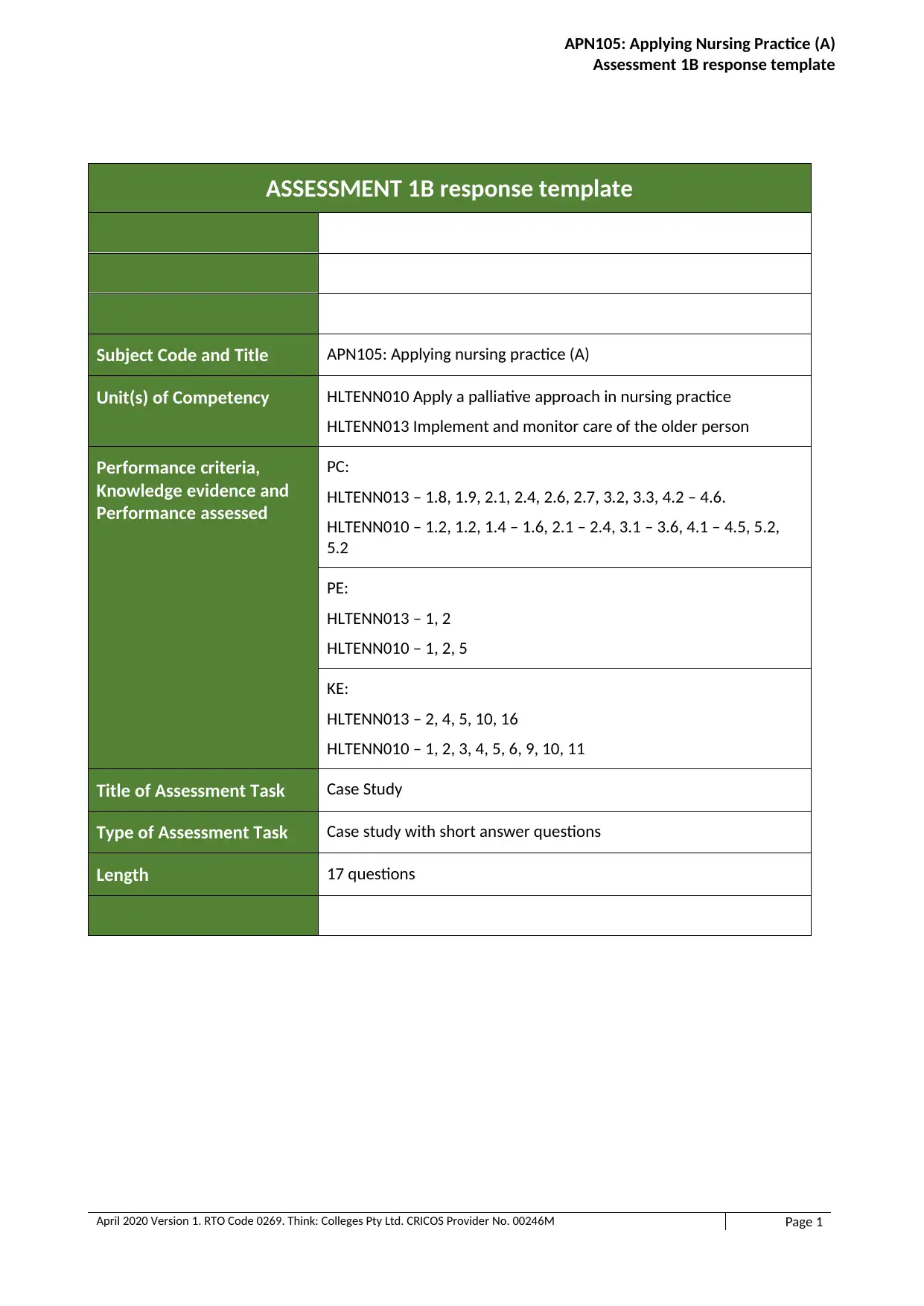
APN105: Applying Nursing Practice (A)
Assessment 1B response template
ASSESSMENT 1B response template
Subject Code and Title APN105: Applying nursing practice (A)
Unit(s) of Competency HLTENN010 Apply a palliative approach in nursing practice
HLTENN013 Implement and monitor care of the older person
Performance criteria,
Knowledge evidence and
Performance assessed
PC:
HLTENN013 – 1.8, 1.9, 2.1, 2.4, 2.6, 2.7, 3.2, 3.3, 4.2 – 4.6.
HLTENN010 – 1.2, 1.2, 1.4 – 1.6, 2.1 – 2.4, 3.1 – 3.6, 4.1 – 4.5, 5.2,
5.2
PE:
HLTENN013 – 1, 2
HLTENN010 – 1, 2, 5
KE:
HLTENN013 – 2, 4, 5, 10, 16
HLTENN010 – 1, 2, 3, 4, 5, 6, 9, 10, 11
Title of Assessment Task Case Study
Type of Assessment Task Case study with short answer questions
Length 17 questions
April 2020 Version 1. RTO Code 0269. Think: Colleges Pty Ltd. CRICOS Provider No. 00246M Page 1
Assessment 1B response template
ASSESSMENT 1B response template
Subject Code and Title APN105: Applying nursing practice (A)
Unit(s) of Competency HLTENN010 Apply a palliative approach in nursing practice
HLTENN013 Implement and monitor care of the older person
Performance criteria,
Knowledge evidence and
Performance assessed
PC:
HLTENN013 – 1.8, 1.9, 2.1, 2.4, 2.6, 2.7, 3.2, 3.3, 4.2 – 4.6.
HLTENN010 – 1.2, 1.2, 1.4 – 1.6, 2.1 – 2.4, 3.1 – 3.6, 4.1 – 4.5, 5.2,
5.2
PE:
HLTENN013 – 1, 2
HLTENN010 – 1, 2, 5
KE:
HLTENN013 – 2, 4, 5, 10, 16
HLTENN010 – 1, 2, 3, 4, 5, 6, 9, 10, 11
Title of Assessment Task Case Study
Type of Assessment Task Case study with short answer questions
Length 17 questions
April 2020 Version 1. RTO Code 0269. Think: Colleges Pty Ltd. CRICOS Provider No. 00246M Page 1
Secure Best Marks with AI Grader
Need help grading? Try our AI Grader for instant feedback on your assignments.
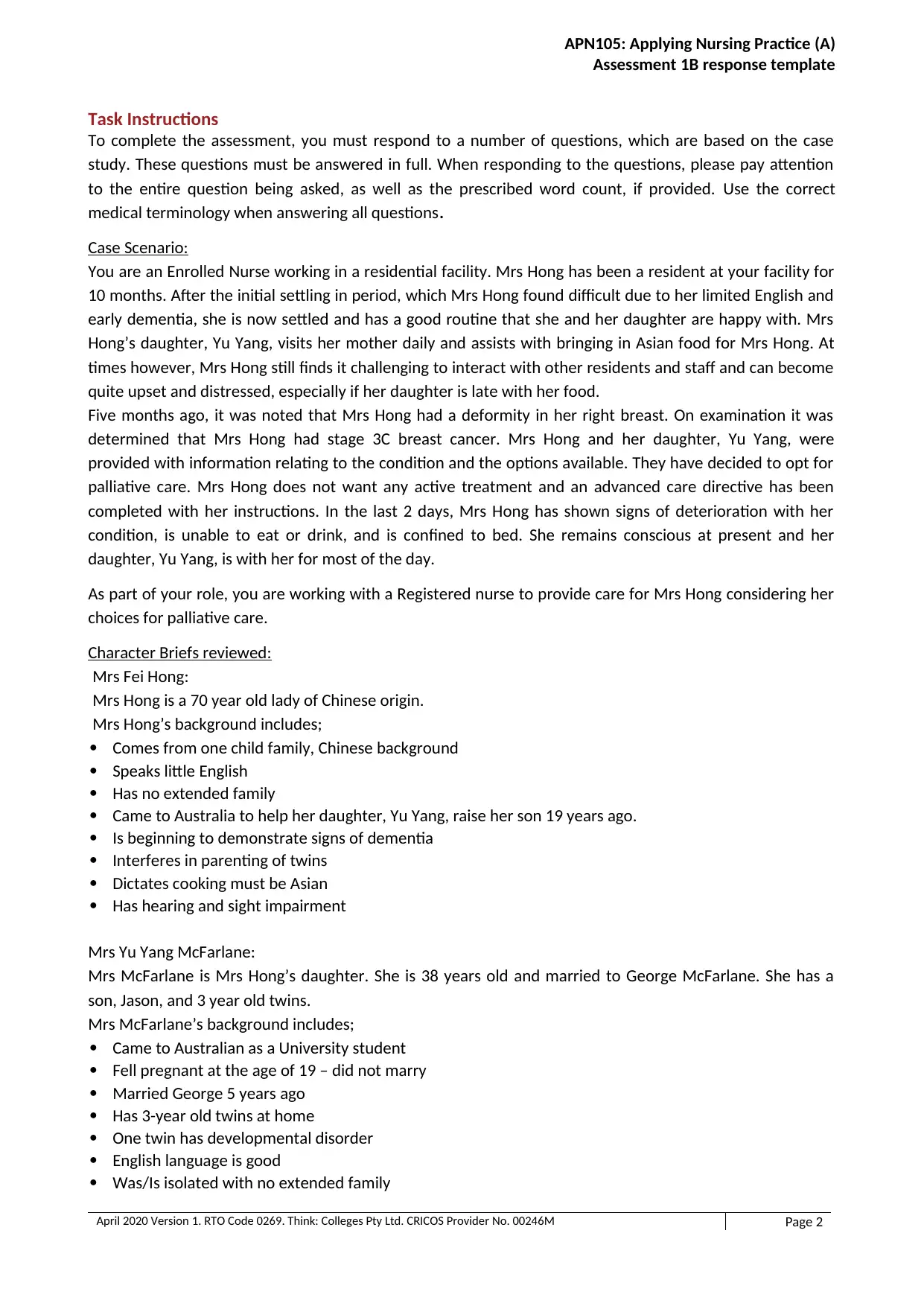
APN105: Applying Nursing Practice (A)
Assessment 1B response template
Task Instructions
To complete the assessment, you must respond to a number of questions, which are based on the case
study. These questions must be answered in full. When responding to the questions, please pay attention
to the entire question being asked, as well as the prescribed word count, if provided. Use the correct
medical terminology when answering all questions.
Case Scenario:
You are an Enrolled Nurse working in a residential facility. Mrs Hong has been a resident at your facility for
10 months. After the initial settling in period, which Mrs Hong found difficult due to her limited English and
early dementia, she is now settled and has a good routine that she and her daughter are happy with. Mrs
Hong’s daughter, Yu Yang, visits her mother daily and assists with bringing in Asian food for Mrs Hong. At
times however, Mrs Hong still finds it challenging to interact with other residents and staff and can become
quite upset and distressed, especially if her daughter is late with her food.
Five months ago, it was noted that Mrs Hong had a deformity in her right breast. On examination it was
determined that Mrs Hong had stage 3C breast cancer. Mrs Hong and her daughter, Yu Yang, were
provided with information relating to the condition and the options available. They have decided to opt for
palliative care. Mrs Hong does not want any active treatment and an advanced care directive has been
completed with her instructions. In the last 2 days, Mrs Hong has shown signs of deterioration with her
condition, is unable to eat or drink, and is confined to bed. She remains conscious at present and her
daughter, Yu Yang, is with her for most of the day.
As part of your role, you are working with a Registered nurse to provide care for Mrs Hong considering her
choices for palliative care.
Character Briefs reviewed:
Mrs Fei Hong:
Mrs Hong is a 70 year old lady of Chinese origin.
Mrs Hong’s background includes;
Comes from one child family, Chinese background
Speaks little English
Has no extended family
Came to Australia to help her daughter, Yu Yang, raise her son 19 years ago.
Is beginning to demonstrate signs of dementia
Interferes in parenting of twins
Dictates cooking must be Asian
Has hearing and sight impairment
Mrs Yu Yang McFarlane:
Mrs McFarlane is Mrs Hong’s daughter. She is 38 years old and married to George McFarlane. She has a
son, Jason, and 3 year old twins.
Mrs McFarlane’s background includes;
Came to Australian as a University student
Fell pregnant at the age of 19 – did not marry
Married George 5 years ago
Has 3-year old twins at home
One twin has developmental disorder
English language is good
Was/Is isolated with no extended family
April 2020 Version 1. RTO Code 0269. Think: Colleges Pty Ltd. CRICOS Provider No. 00246M Page 2
Assessment 1B response template
Task Instructions
To complete the assessment, you must respond to a number of questions, which are based on the case
study. These questions must be answered in full. When responding to the questions, please pay attention
to the entire question being asked, as well as the prescribed word count, if provided. Use the correct
medical terminology when answering all questions.
Case Scenario:
You are an Enrolled Nurse working in a residential facility. Mrs Hong has been a resident at your facility for
10 months. After the initial settling in period, which Mrs Hong found difficult due to her limited English and
early dementia, she is now settled and has a good routine that she and her daughter are happy with. Mrs
Hong’s daughter, Yu Yang, visits her mother daily and assists with bringing in Asian food for Mrs Hong. At
times however, Mrs Hong still finds it challenging to interact with other residents and staff and can become
quite upset and distressed, especially if her daughter is late with her food.
Five months ago, it was noted that Mrs Hong had a deformity in her right breast. On examination it was
determined that Mrs Hong had stage 3C breast cancer. Mrs Hong and her daughter, Yu Yang, were
provided with information relating to the condition and the options available. They have decided to opt for
palliative care. Mrs Hong does not want any active treatment and an advanced care directive has been
completed with her instructions. In the last 2 days, Mrs Hong has shown signs of deterioration with her
condition, is unable to eat or drink, and is confined to bed. She remains conscious at present and her
daughter, Yu Yang, is with her for most of the day.
As part of your role, you are working with a Registered nurse to provide care for Mrs Hong considering her
choices for palliative care.
Character Briefs reviewed:
Mrs Fei Hong:
Mrs Hong is a 70 year old lady of Chinese origin.
Mrs Hong’s background includes;
Comes from one child family, Chinese background
Speaks little English
Has no extended family
Came to Australia to help her daughter, Yu Yang, raise her son 19 years ago.
Is beginning to demonstrate signs of dementia
Interferes in parenting of twins
Dictates cooking must be Asian
Has hearing and sight impairment
Mrs Yu Yang McFarlane:
Mrs McFarlane is Mrs Hong’s daughter. She is 38 years old and married to George McFarlane. She has a
son, Jason, and 3 year old twins.
Mrs McFarlane’s background includes;
Came to Australian as a University student
Fell pregnant at the age of 19 – did not marry
Married George 5 years ago
Has 3-year old twins at home
One twin has developmental disorder
English language is good
Was/Is isolated with no extended family
April 2020 Version 1. RTO Code 0269. Think: Colleges Pty Ltd. CRICOS Provider No. 00246M Page 2
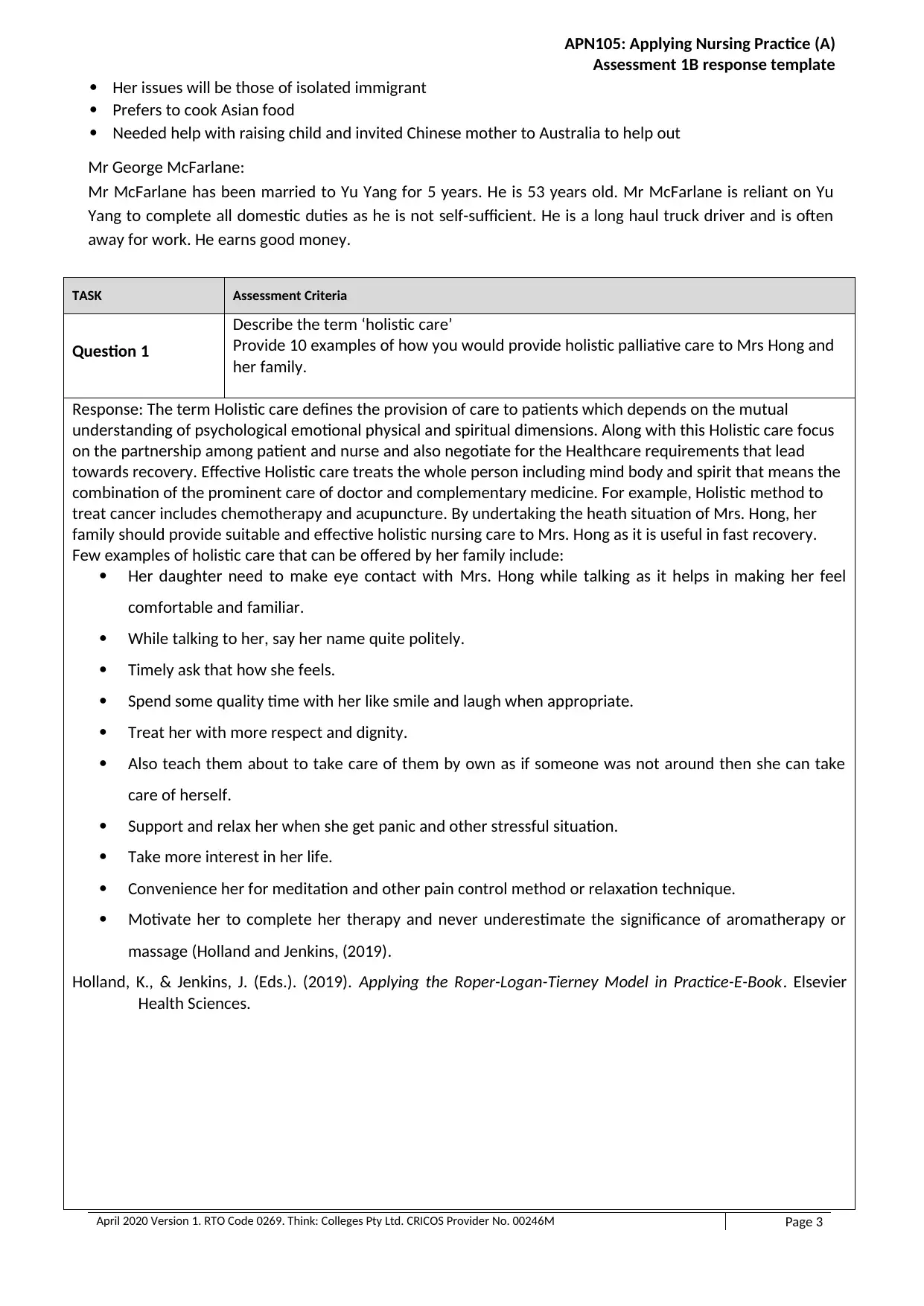
APN105: Applying Nursing Practice (A)
Assessment 1B response template
Her issues will be those of isolated immigrant
Prefers to cook Asian food
Needed help with raising child and invited Chinese mother to Australia to help out
Mr George McFarlane:
Mr McFarlane has been married to Yu Yang for 5 years. He is 53 years old. Mr McFarlane is reliant on Yu
Yang to complete all domestic duties as he is not self-sufficient. He is a long haul truck driver and is often
away for work. He earns good money.
TASK Assessment Criteria
Question 1
Describe the term ‘holistic care’
Provide 10 examples of how you would provide holistic palliative care to Mrs Hong and
her family.
Response: The term Holistic care defines the provision of care to patients which depends on the mutual
understanding of psychological emotional physical and spiritual dimensions. Along with this Holistic care focus
on the partnership among patient and nurse and also negotiate for the Healthcare requirements that lead
towards recovery. Effective Holistic care treats the whole person including mind body and spirit that means the
combination of the prominent care of doctor and complementary medicine. For example, Holistic method to
treat cancer includes chemotherapy and acupuncture. By undertaking the heath situation of Mrs. Hong, her
family should provide suitable and effective holistic nursing care to Mrs. Hong as it is useful in fast recovery.
Few examples of holistic care that can be offered by her family include:
Her daughter need to make eye contact with Mrs. Hong while talking as it helps in making her feel
comfortable and familiar.
While talking to her, say her name quite politely.
Timely ask that how she feels.
Spend some quality time with her like smile and laugh when appropriate.
Treat her with more respect and dignity.
Also teach them about to take care of them by own as if someone was not around then she can take
care of herself.
Support and relax her when she get panic and other stressful situation.
Take more interest in her life.
Convenience her for meditation and other pain control method or relaxation technique.
Motivate her to complete her therapy and never underestimate the significance of aromatherapy or
massage (Holland and Jenkins, (2019).
Holland, K., & Jenkins, J. (Eds.). (2019). Applying the Roper-Logan-Tierney Model in Practice-E-Book. Elsevier
Health Sciences.
April 2020 Version 1. RTO Code 0269. Think: Colleges Pty Ltd. CRICOS Provider No. 00246M Page 3
Assessment 1B response template
Her issues will be those of isolated immigrant
Prefers to cook Asian food
Needed help with raising child and invited Chinese mother to Australia to help out
Mr George McFarlane:
Mr McFarlane has been married to Yu Yang for 5 years. He is 53 years old. Mr McFarlane is reliant on Yu
Yang to complete all domestic duties as he is not self-sufficient. He is a long haul truck driver and is often
away for work. He earns good money.
TASK Assessment Criteria
Question 1
Describe the term ‘holistic care’
Provide 10 examples of how you would provide holistic palliative care to Mrs Hong and
her family.
Response: The term Holistic care defines the provision of care to patients which depends on the mutual
understanding of psychological emotional physical and spiritual dimensions. Along with this Holistic care focus
on the partnership among patient and nurse and also negotiate for the Healthcare requirements that lead
towards recovery. Effective Holistic care treats the whole person including mind body and spirit that means the
combination of the prominent care of doctor and complementary medicine. For example, Holistic method to
treat cancer includes chemotherapy and acupuncture. By undertaking the heath situation of Mrs. Hong, her
family should provide suitable and effective holistic nursing care to Mrs. Hong as it is useful in fast recovery.
Few examples of holistic care that can be offered by her family include:
Her daughter need to make eye contact with Mrs. Hong while talking as it helps in making her feel
comfortable and familiar.
While talking to her, say her name quite politely.
Timely ask that how she feels.
Spend some quality time with her like smile and laugh when appropriate.
Treat her with more respect and dignity.
Also teach them about to take care of them by own as if someone was not around then she can take
care of herself.
Support and relax her when she get panic and other stressful situation.
Take more interest in her life.
Convenience her for meditation and other pain control method or relaxation technique.
Motivate her to complete her therapy and never underestimate the significance of aromatherapy or
massage (Holland and Jenkins, (2019).
Holland, K., & Jenkins, J. (Eds.). (2019). Applying the Roper-Logan-Tierney Model in Practice-E-Book. Elsevier
Health Sciences.
April 2020 Version 1. RTO Code 0269. Think: Colleges Pty Ltd. CRICOS Provider No. 00246M Page 3
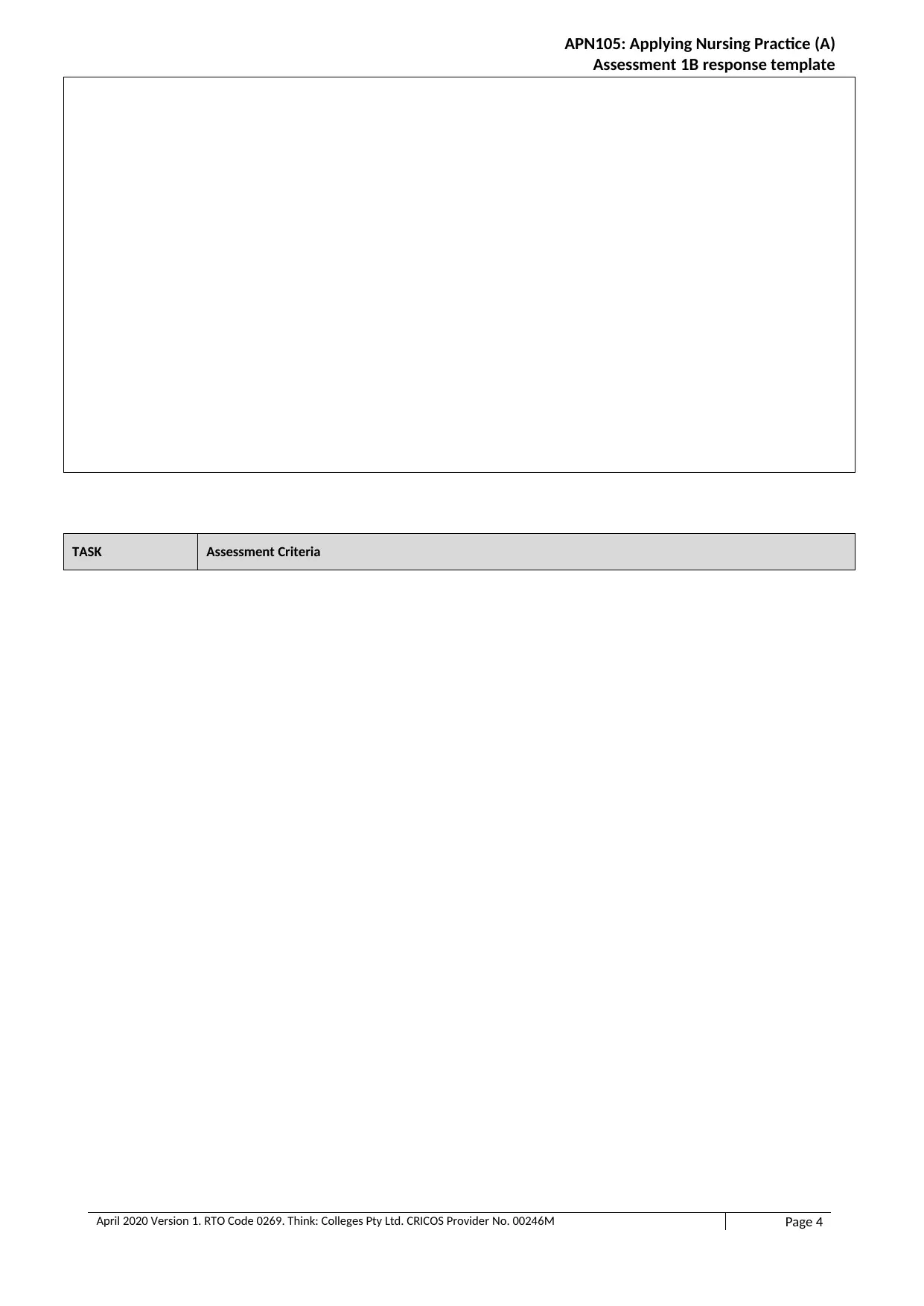
APN105: Applying Nursing Practice (A)
Assessment 1B response template
TASK Assessment Criteria
April 2020 Version 1. RTO Code 0269. Think: Colleges Pty Ltd. CRICOS Provider No. 00246M Page 4
Assessment 1B response template
TASK Assessment Criteria
April 2020 Version 1. RTO Code 0269. Think: Colleges Pty Ltd. CRICOS Provider No. 00246M Page 4
Secure Best Marks with AI Grader
Need help grading? Try our AI Grader for instant feedback on your assignments.
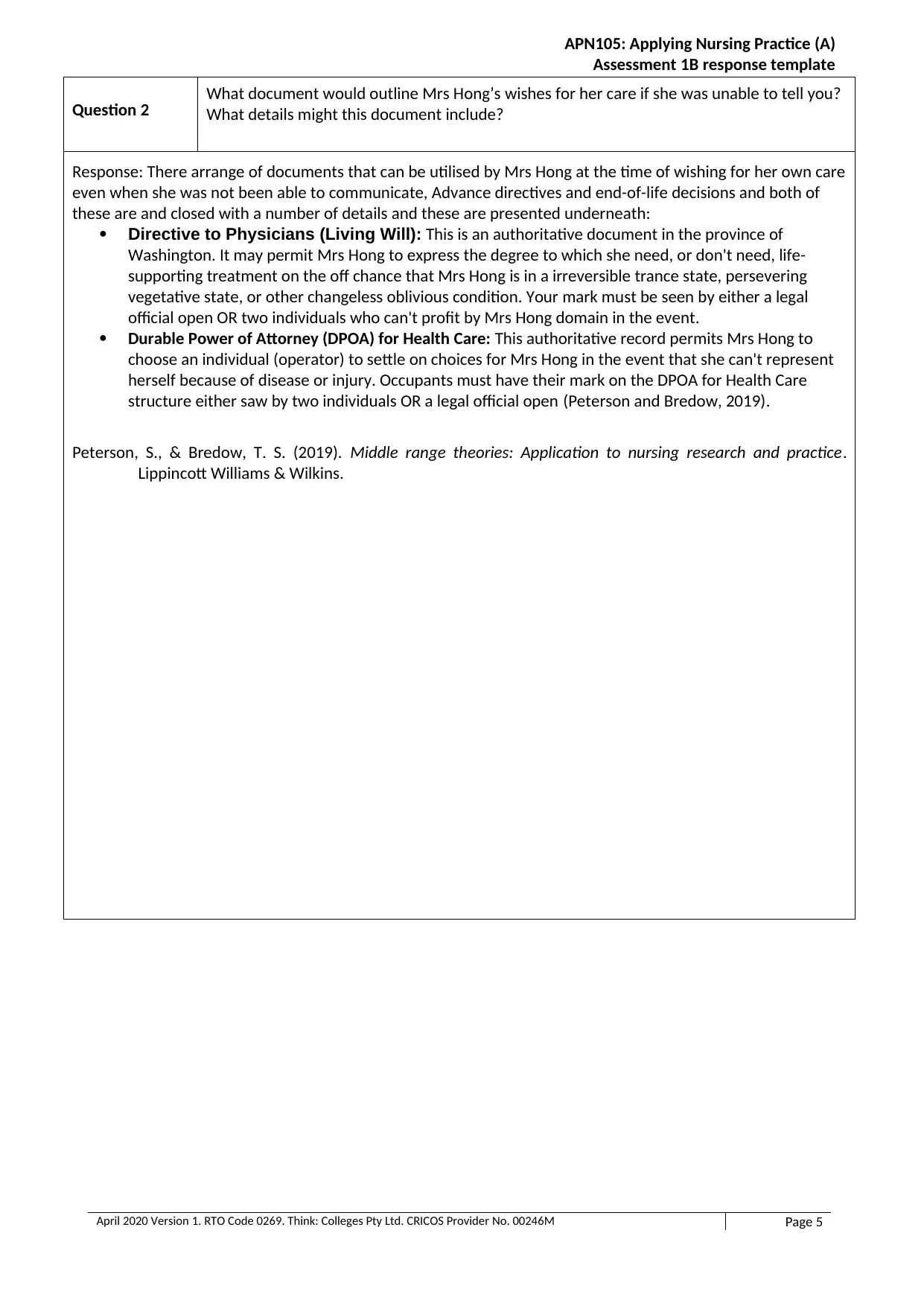
APN105: Applying Nursing Practice (A)
Assessment 1B response template
Question 2 What document would outline Mrs Hong’s wishes for her care if she was unable to tell you?
What details might this document include?
Response: There arrange of documents that can be utilised by Mrs Hong at the time of wishing for her own care
even when she was not been able to communicate, Advance directives and end-of-life decisions and both of
these are and closed with a number of details and these are presented underneath:
Directive to Physicians (Living Will): This is an authoritative document in the province of
Washington. It may permit Mrs Hong to express the degree to which she need, or don't need, life-
supporting treatment on the off chance that Mrs Hong is in a irreversible trance state, persevering
vegetative state, or other changeless oblivious condition. Your mark must be seen by either a legal
official open OR two individuals who can't profit by Mrs Hong domain in the event.
Durable Power of Attorney (DPOA) for Health Care: This authoritative record permits Mrs Hong to
choose an individual (operator) to settle on choices for Mrs Hong in the event that she can't represent
herself because of disease or injury. Occupants must have their mark on the DPOA for Health Care
structure either saw by two individuals OR a legal official open (Peterson and Bredow, 2019).
Peterson, S., & Bredow, T. S. (2019). Middle range theories: Application to nursing research and practice.
Lippincott Williams & Wilkins.
April 2020 Version 1. RTO Code 0269. Think: Colleges Pty Ltd. CRICOS Provider No. 00246M Page 5
Assessment 1B response template
Question 2 What document would outline Mrs Hong’s wishes for her care if she was unable to tell you?
What details might this document include?
Response: There arrange of documents that can be utilised by Mrs Hong at the time of wishing for her own care
even when she was not been able to communicate, Advance directives and end-of-life decisions and both of
these are and closed with a number of details and these are presented underneath:
Directive to Physicians (Living Will): This is an authoritative document in the province of
Washington. It may permit Mrs Hong to express the degree to which she need, or don't need, life-
supporting treatment on the off chance that Mrs Hong is in a irreversible trance state, persevering
vegetative state, or other changeless oblivious condition. Your mark must be seen by either a legal
official open OR two individuals who can't profit by Mrs Hong domain in the event.
Durable Power of Attorney (DPOA) for Health Care: This authoritative record permits Mrs Hong to
choose an individual (operator) to settle on choices for Mrs Hong in the event that she can't represent
herself because of disease or injury. Occupants must have their mark on the DPOA for Health Care
structure either saw by two individuals OR a legal official open (Peterson and Bredow, 2019).
Peterson, S., & Bredow, T. S. (2019). Middle range theories: Application to nursing research and practice.
Lippincott Williams & Wilkins.
April 2020 Version 1. RTO Code 0269. Think: Colleges Pty Ltd. CRICOS Provider No. 00246M Page 5
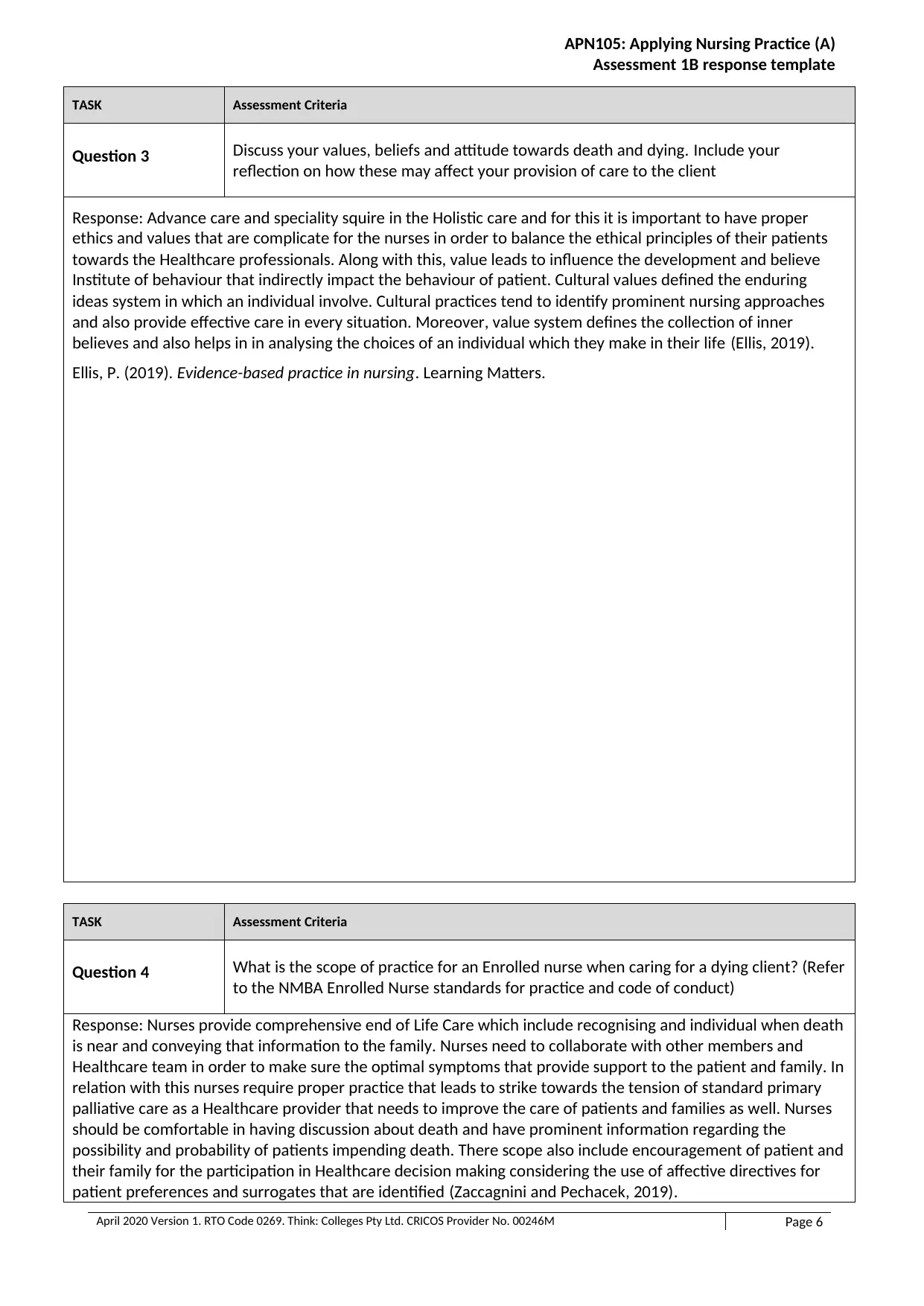
APN105: Applying Nursing Practice (A)
Assessment 1B response template
TASK Assessment Criteria
Question 3 Discuss your values, beliefs and attitude towards death and dying. Include your
reflection on how these may affect your provision of care to the client
Response: Advance care and speciality squire in the Holistic care and for this it is important to have proper
ethics and values that are complicate for the nurses in order to balance the ethical principles of their patients
towards the Healthcare professionals. Along with this, value leads to influence the development and believe
Institute of behaviour that indirectly impact the behaviour of patient. Cultural values defined the enduring
ideas system in which an individual involve. Cultural practices tend to identify prominent nursing approaches
and also provide effective care in every situation. Moreover, value system defines the collection of inner
believes and also helps in in analysing the choices of an individual which they make in their life (Ellis, 2019).
Ellis, P. (2019). Evidence-based practice in nursing. Learning Matters.
TASK Assessment Criteria
Question 4 What is the scope of practice for an Enrolled nurse when caring for a dying client? (Refer
to the NMBA Enrolled Nurse standards for practice and code of conduct)
Response: Nurses provide comprehensive end of Life Care which include recognising and individual when death
is near and conveying that information to the family. Nurses need to collaborate with other members and
Healthcare team in order to make sure the optimal symptoms that provide support to the patient and family. In
relation with this nurses require proper practice that leads to strike towards the tension of standard primary
palliative care as a Healthcare provider that needs to improve the care of patients and families as well. Nurses
should be comfortable in having discussion about death and have prominent information regarding the
possibility and probability of patients impending death. There scope also include encouragement of patient and
their family for the participation in Healthcare decision making considering the use of affective directives for
patient preferences and surrogates that are identified (Zaccagnini and Pechacek, 2019).
April 2020 Version 1. RTO Code 0269. Think: Colleges Pty Ltd. CRICOS Provider No. 00246M Page 6
Assessment 1B response template
TASK Assessment Criteria
Question 3 Discuss your values, beliefs and attitude towards death and dying. Include your
reflection on how these may affect your provision of care to the client
Response: Advance care and speciality squire in the Holistic care and for this it is important to have proper
ethics and values that are complicate for the nurses in order to balance the ethical principles of their patients
towards the Healthcare professionals. Along with this, value leads to influence the development and believe
Institute of behaviour that indirectly impact the behaviour of patient. Cultural values defined the enduring
ideas system in which an individual involve. Cultural practices tend to identify prominent nursing approaches
and also provide effective care in every situation. Moreover, value system defines the collection of inner
believes and also helps in in analysing the choices of an individual which they make in their life (Ellis, 2019).
Ellis, P. (2019). Evidence-based practice in nursing. Learning Matters.
TASK Assessment Criteria
Question 4 What is the scope of practice for an Enrolled nurse when caring for a dying client? (Refer
to the NMBA Enrolled Nurse standards for practice and code of conduct)
Response: Nurses provide comprehensive end of Life Care which include recognising and individual when death
is near and conveying that information to the family. Nurses need to collaborate with other members and
Healthcare team in order to make sure the optimal symptoms that provide support to the patient and family. In
relation with this nurses require proper practice that leads to strike towards the tension of standard primary
palliative care as a Healthcare provider that needs to improve the care of patients and families as well. Nurses
should be comfortable in having discussion about death and have prominent information regarding the
possibility and probability of patients impending death. There scope also include encouragement of patient and
their family for the participation in Healthcare decision making considering the use of affective directives for
patient preferences and surrogates that are identified (Zaccagnini and Pechacek, 2019).
April 2020 Version 1. RTO Code 0269. Think: Colleges Pty Ltd. CRICOS Provider No. 00246M Page 6
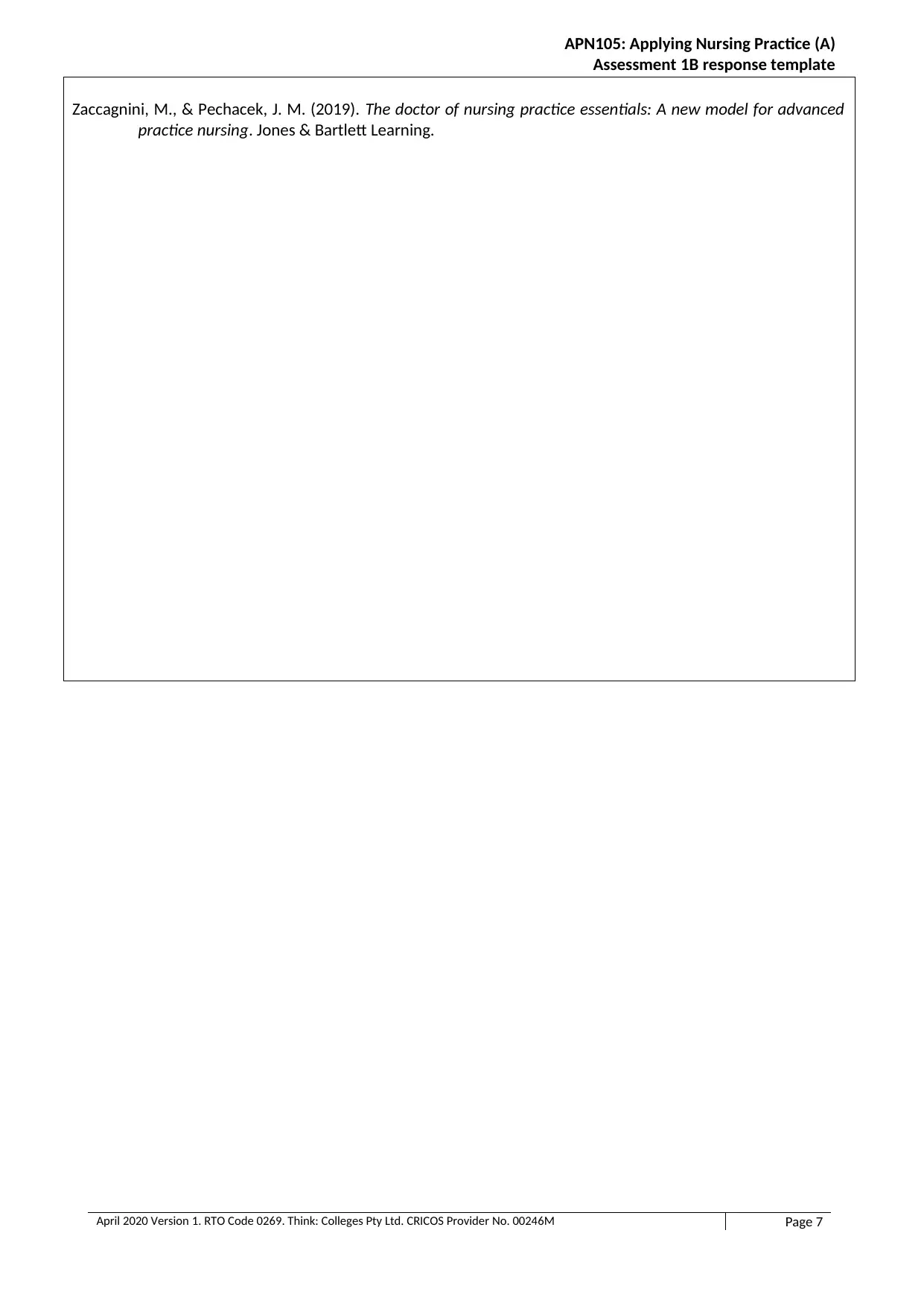
APN105: Applying Nursing Practice (A)
Assessment 1B response template
Zaccagnini, M., & Pechacek, J. M. (2019). The doctor of nursing practice essentials: A new model for advanced
practice nursing. Jones & Bartlett Learning.
April 2020 Version 1. RTO Code 0269. Think: Colleges Pty Ltd. CRICOS Provider No. 00246M Page 7
Assessment 1B response template
Zaccagnini, M., & Pechacek, J. M. (2019). The doctor of nursing practice essentials: A new model for advanced
practice nursing. Jones & Bartlett Learning.
April 2020 Version 1. RTO Code 0269. Think: Colleges Pty Ltd. CRICOS Provider No. 00246M Page 7
Paraphrase This Document
Need a fresh take? Get an instant paraphrase of this document with our AI Paraphraser
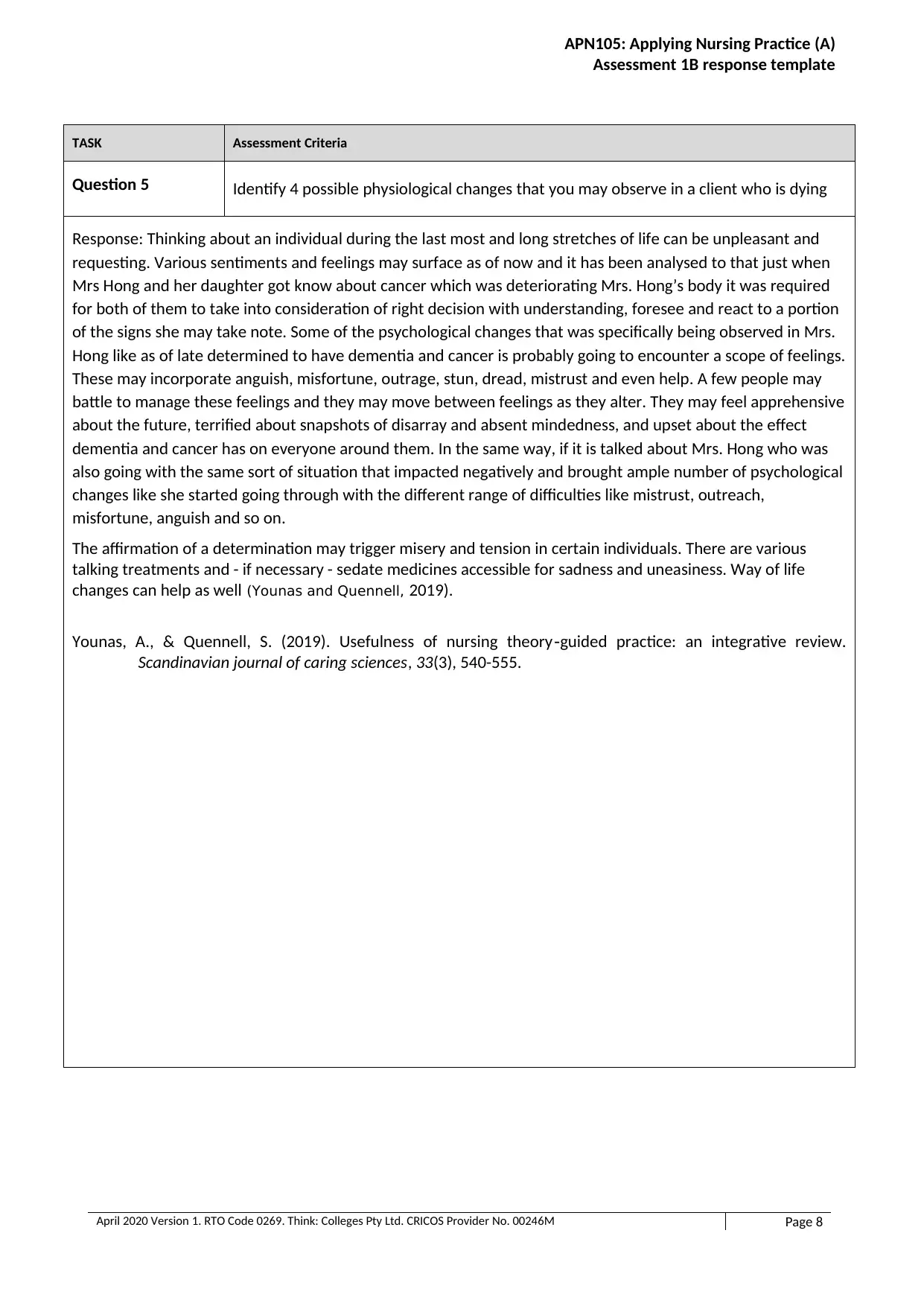
APN105: Applying Nursing Practice (A)
Assessment 1B response template
TASK Assessment Criteria
Question 5 Identify 4 possible physiological changes that you may observe in a client who is dying
Response: Thinking about an individual during the last most and long stretches of life can be unpleasant and
requesting. Various sentiments and feelings may surface as of now and it has been analysed to that just when
Mrs Hong and her daughter got know about cancer which was deteriorating Mrs. Hong’s body it was required
for both of them to take into consideration of right decision with understanding, foresee and react to a portion
of the signs she may take note. Some of the psychological changes that was specifically being observed in Mrs.
Hong like as of late determined to have dementia and cancer is probably going to encounter a scope of feelings.
These may incorporate anguish, misfortune, outrage, stun, dread, mistrust and even help. A few people may
battle to manage these feelings and they may move between feelings as they alter. They may feel apprehensive
about the future, terrified about snapshots of disarray and absent mindedness, and upset about the effect
dementia and cancer has on everyone around them. In the same way, if it is talked about Mrs. Hong who was
also going with the same sort of situation that impacted negatively and brought ample number of psychological
changes like she started going through with the different range of difficulties like mistrust, outreach,
misfortune, anguish and so on.
The affirmation of a determination may trigger misery and tension in certain individuals. There are various
talking treatments and - if necessary - sedate medicines accessible for sadness and uneasiness. Way of life
changes can help as well (Younas and Quennell, 2019).
Younas, A., & Quennell, S. (2019). Usefulness of nursing theory‐guided practice: an integrative review.
Scandinavian journal of caring sciences, 33(3), 540-555.
April 2020 Version 1. RTO Code 0269. Think: Colleges Pty Ltd. CRICOS Provider No. 00246M Page 8
Assessment 1B response template
TASK Assessment Criteria
Question 5 Identify 4 possible physiological changes that you may observe in a client who is dying
Response: Thinking about an individual during the last most and long stretches of life can be unpleasant and
requesting. Various sentiments and feelings may surface as of now and it has been analysed to that just when
Mrs Hong and her daughter got know about cancer which was deteriorating Mrs. Hong’s body it was required
for both of them to take into consideration of right decision with understanding, foresee and react to a portion
of the signs she may take note. Some of the psychological changes that was specifically being observed in Mrs.
Hong like as of late determined to have dementia and cancer is probably going to encounter a scope of feelings.
These may incorporate anguish, misfortune, outrage, stun, dread, mistrust and even help. A few people may
battle to manage these feelings and they may move between feelings as they alter. They may feel apprehensive
about the future, terrified about snapshots of disarray and absent mindedness, and upset about the effect
dementia and cancer has on everyone around them. In the same way, if it is talked about Mrs. Hong who was
also going with the same sort of situation that impacted negatively and brought ample number of psychological
changes like she started going through with the different range of difficulties like mistrust, outreach,
misfortune, anguish and so on.
The affirmation of a determination may trigger misery and tension in certain individuals. There are various
talking treatments and - if necessary - sedate medicines accessible for sadness and uneasiness. Way of life
changes can help as well (Younas and Quennell, 2019).
Younas, A., & Quennell, S. (2019). Usefulness of nursing theory‐guided practice: an integrative review.
Scandinavian journal of caring sciences, 33(3), 540-555.
April 2020 Version 1. RTO Code 0269. Think: Colleges Pty Ltd. CRICOS Provider No. 00246M Page 8
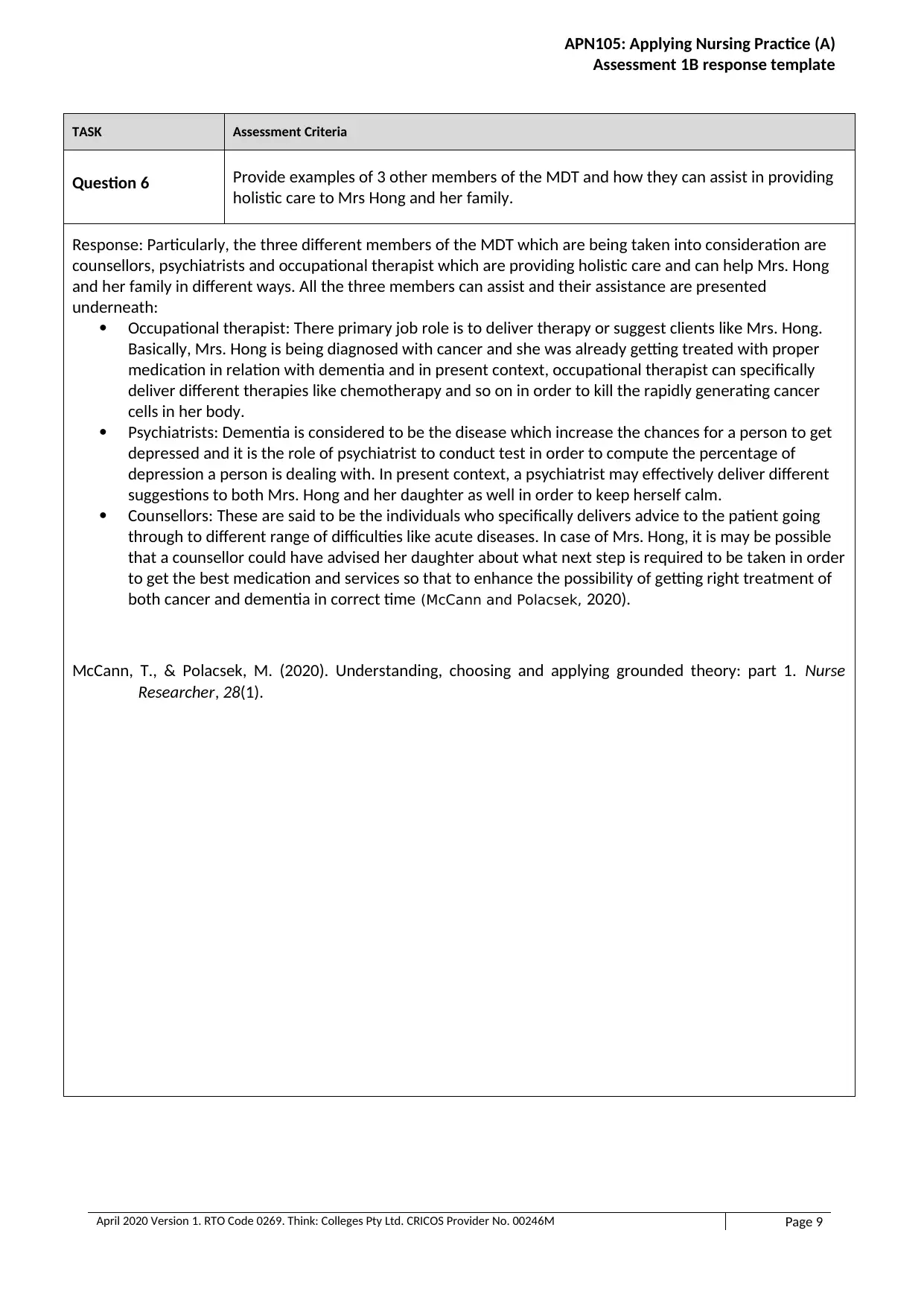
APN105: Applying Nursing Practice (A)
Assessment 1B response template
TASK Assessment Criteria
Question 6 Provide examples of 3 other members of the MDT and how they can assist in providing
holistic care to Mrs Hong and her family.
Response: Particularly, the three different members of the MDT which are being taken into consideration are
counsellors, psychiatrists and occupational therapist which are providing holistic care and can help Mrs. Hong
and her family in different ways. All the three members can assist and their assistance are presented
underneath:
Occupational therapist: There primary job role is to deliver therapy or suggest clients like Mrs. Hong.
Basically, Mrs. Hong is being diagnosed with cancer and she was already getting treated with proper
medication in relation with dementia and in present context, occupational therapist can specifically
deliver different therapies like chemotherapy and so on in order to kill the rapidly generating cancer
cells in her body.
Psychiatrists: Dementia is considered to be the disease which increase the chances for a person to get
depressed and it is the role of psychiatrist to conduct test in order to compute the percentage of
depression a person is dealing with. In present context, a psychiatrist may effectively deliver different
suggestions to both Mrs. Hong and her daughter as well in order to keep herself calm.
Counsellors: These are said to be the individuals who specifically delivers advice to the patient going
through to different range of difficulties like acute diseases. In case of Mrs. Hong, it is may be possible
that a counsellor could have advised her daughter about what next step is required to be taken in order
to get the best medication and services so that to enhance the possibility of getting right treatment of
both cancer and dementia in correct time (McCann and Polacsek, 2020).
McCann, T., & Polacsek, M. (2020). Understanding, choosing and applying grounded theory: part 1. Nurse
Researcher, 28(1).
April 2020 Version 1. RTO Code 0269. Think: Colleges Pty Ltd. CRICOS Provider No. 00246M Page 9
Assessment 1B response template
TASK Assessment Criteria
Question 6 Provide examples of 3 other members of the MDT and how they can assist in providing
holistic care to Mrs Hong and her family.
Response: Particularly, the three different members of the MDT which are being taken into consideration are
counsellors, psychiatrists and occupational therapist which are providing holistic care and can help Mrs. Hong
and her family in different ways. All the three members can assist and their assistance are presented
underneath:
Occupational therapist: There primary job role is to deliver therapy or suggest clients like Mrs. Hong.
Basically, Mrs. Hong is being diagnosed with cancer and she was already getting treated with proper
medication in relation with dementia and in present context, occupational therapist can specifically
deliver different therapies like chemotherapy and so on in order to kill the rapidly generating cancer
cells in her body.
Psychiatrists: Dementia is considered to be the disease which increase the chances for a person to get
depressed and it is the role of psychiatrist to conduct test in order to compute the percentage of
depression a person is dealing with. In present context, a psychiatrist may effectively deliver different
suggestions to both Mrs. Hong and her daughter as well in order to keep herself calm.
Counsellors: These are said to be the individuals who specifically delivers advice to the patient going
through to different range of difficulties like acute diseases. In case of Mrs. Hong, it is may be possible
that a counsellor could have advised her daughter about what next step is required to be taken in order
to get the best medication and services so that to enhance the possibility of getting right treatment of
both cancer and dementia in correct time (McCann and Polacsek, 2020).
McCann, T., & Polacsek, M. (2020). Understanding, choosing and applying grounded theory: part 1. Nurse
Researcher, 28(1).
April 2020 Version 1. RTO Code 0269. Think: Colleges Pty Ltd. CRICOS Provider No. 00246M Page 9
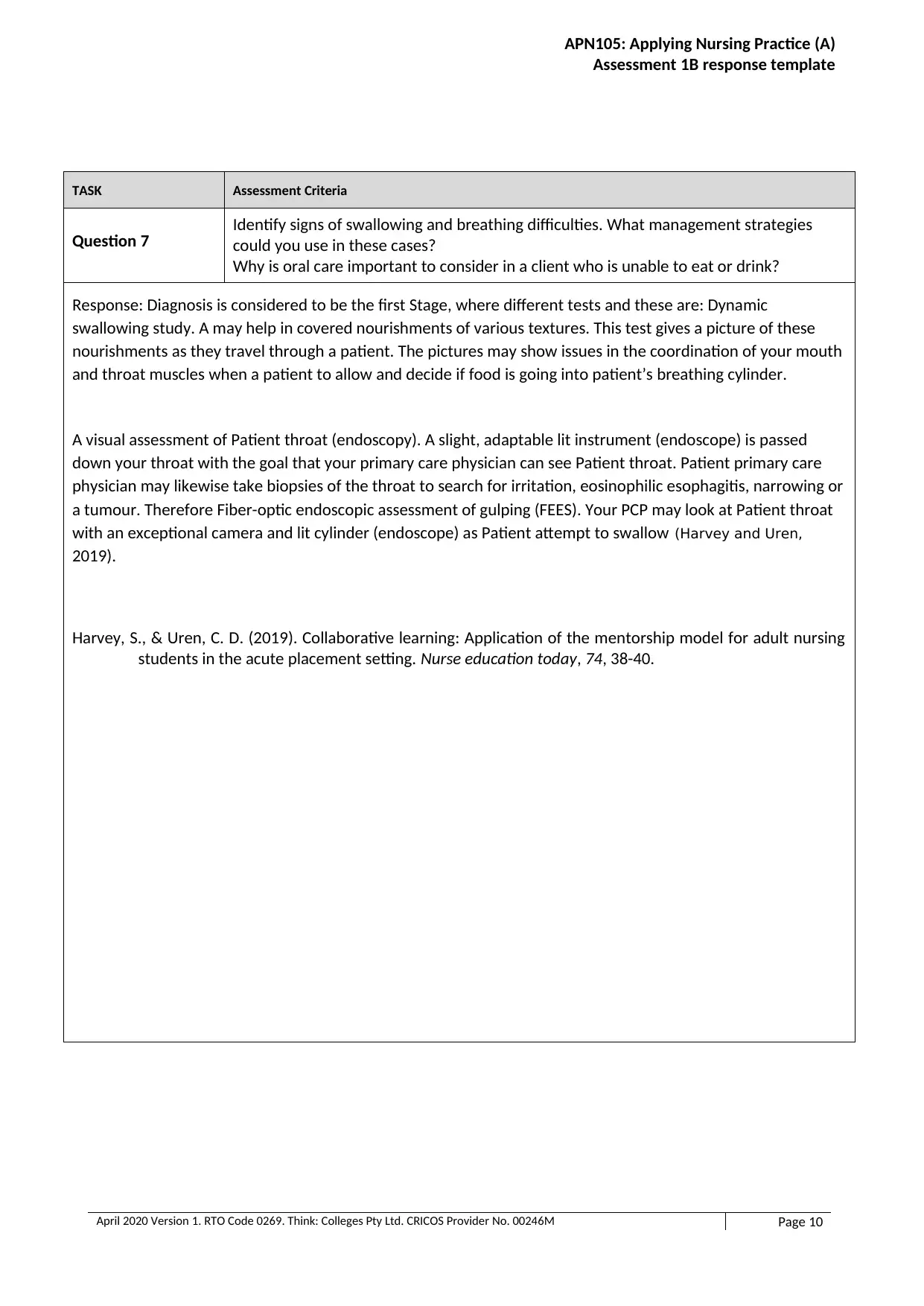
APN105: Applying Nursing Practice (A)
Assessment 1B response template
TASK Assessment Criteria
Question 7 Identify signs of swallowing and breathing difficulties. What management strategies
could you use in these cases?
Why is oral care important to consider in a client who is unable to eat or drink?
Response: Diagnosis is considered to be the first Stage, where different tests and these are: Dynamic
swallowing study. A may help in covered nourishments of various textures. This test gives a picture of these
nourishments as they travel through a patient. The pictures may show issues in the coordination of your mouth
and throat muscles when a patient to allow and decide if food is going into patient’s breathing cylinder.
A visual assessment of Patient throat (endoscopy). A slight, adaptable lit instrument (endoscope) is passed
down your throat with the goal that your primary care physician can see Patient throat. Patient primary care
physician may likewise take biopsies of the throat to search for irritation, eosinophilic esophagitis, narrowing or
a tumour. Therefore Fiber-optic endoscopic assessment of gulping (FEES). Your PCP may look at Patient throat
with an exceptional camera and lit cylinder (endoscope) as Patient attempt to swallow (Harvey and Uren,
2019).
Harvey, S., & Uren, C. D. (2019). Collaborative learning: Application of the mentorship model for adult nursing
students in the acute placement setting. Nurse education today, 74, 38-40.
April 2020 Version 1. RTO Code 0269. Think: Colleges Pty Ltd. CRICOS Provider No. 00246M Page 10
Assessment 1B response template
TASK Assessment Criteria
Question 7 Identify signs of swallowing and breathing difficulties. What management strategies
could you use in these cases?
Why is oral care important to consider in a client who is unable to eat or drink?
Response: Diagnosis is considered to be the first Stage, where different tests and these are: Dynamic
swallowing study. A may help in covered nourishments of various textures. This test gives a picture of these
nourishments as they travel through a patient. The pictures may show issues in the coordination of your mouth
and throat muscles when a patient to allow and decide if food is going into patient’s breathing cylinder.
A visual assessment of Patient throat (endoscopy). A slight, adaptable lit instrument (endoscope) is passed
down your throat with the goal that your primary care physician can see Patient throat. Patient primary care
physician may likewise take biopsies of the throat to search for irritation, eosinophilic esophagitis, narrowing or
a tumour. Therefore Fiber-optic endoscopic assessment of gulping (FEES). Your PCP may look at Patient throat
with an exceptional camera and lit cylinder (endoscope) as Patient attempt to swallow (Harvey and Uren,
2019).
Harvey, S., & Uren, C. D. (2019). Collaborative learning: Application of the mentorship model for adult nursing
students in the acute placement setting. Nurse education today, 74, 38-40.
April 2020 Version 1. RTO Code 0269. Think: Colleges Pty Ltd. CRICOS Provider No. 00246M Page 10
Secure Best Marks with AI Grader
Need help grading? Try our AI Grader for instant feedback on your assignments.
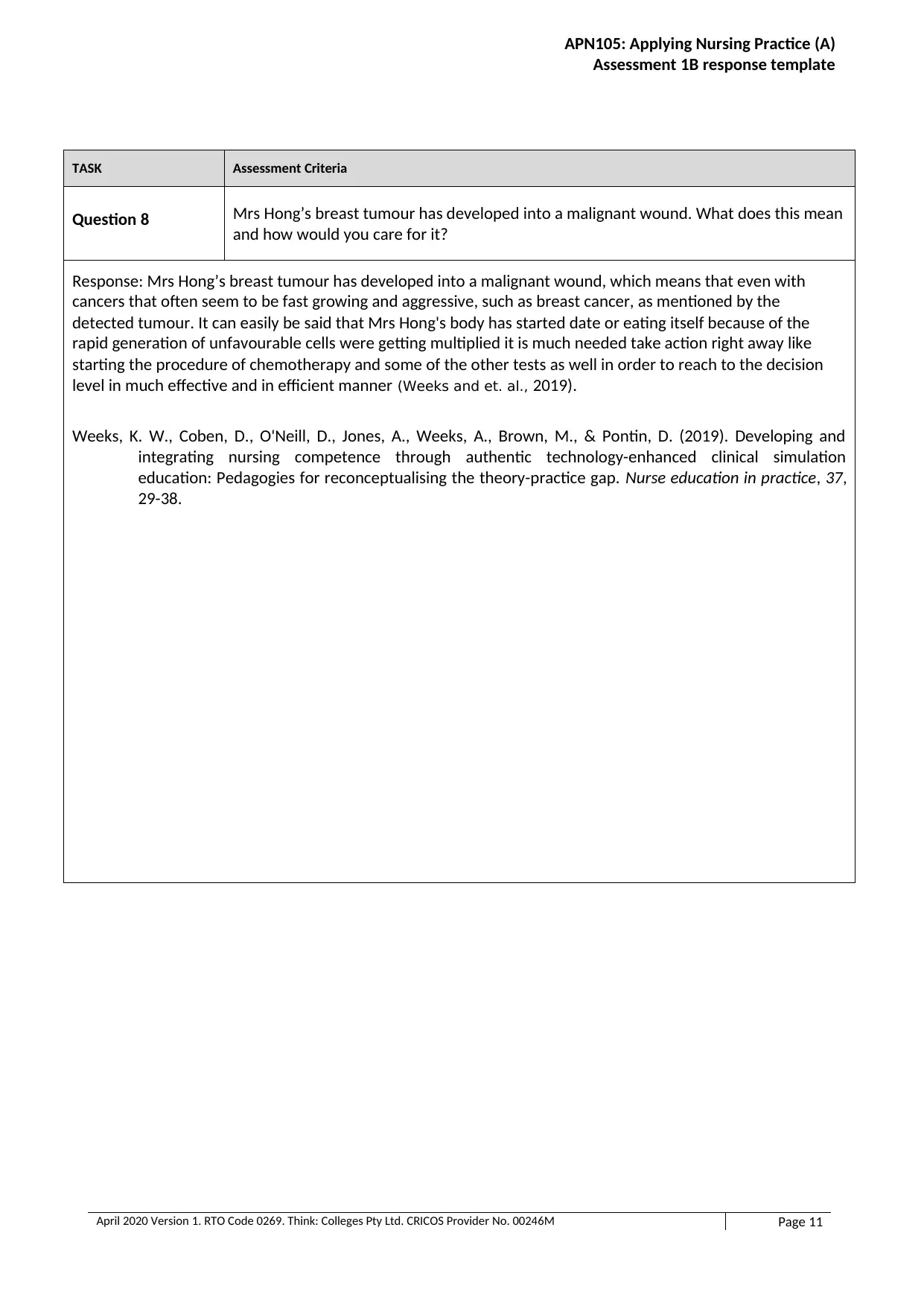
APN105: Applying Nursing Practice (A)
Assessment 1B response template
TASK Assessment Criteria
Question 8 Mrs Hong’s breast tumour has developed into a malignant wound. What does this mean
and how would you care for it?
Response: Mrs Hong’s breast tumour has developed into a malignant wound, which means that even with
cancers that often seem to be fast growing and aggressive, such as breast cancer, as mentioned by the
detected tumour. It can easily be said that Mrs Hong's body has started date or eating itself because of the
rapid generation of unfavourable cells were getting multiplied it is much needed take action right away like
starting the procedure of chemotherapy and some of the other tests as well in order to reach to the decision
level in much effective and in efficient manner (Weeks and et. al., 2019).
Weeks, K. W., Coben, D., O'Neill, D., Jones, A., Weeks, A., Brown, M., & Pontin, D. (2019). Developing and
integrating nursing competence through authentic technology-enhanced clinical simulation
education: Pedagogies for reconceptualising the theory-practice gap. Nurse education in practice, 37,
29-38.
April 2020 Version 1. RTO Code 0269. Think: Colleges Pty Ltd. CRICOS Provider No. 00246M Page 11
Assessment 1B response template
TASK Assessment Criteria
Question 8 Mrs Hong’s breast tumour has developed into a malignant wound. What does this mean
and how would you care for it?
Response: Mrs Hong’s breast tumour has developed into a malignant wound, which means that even with
cancers that often seem to be fast growing and aggressive, such as breast cancer, as mentioned by the
detected tumour. It can easily be said that Mrs Hong's body has started date or eating itself because of the
rapid generation of unfavourable cells were getting multiplied it is much needed take action right away like
starting the procedure of chemotherapy and some of the other tests as well in order to reach to the decision
level in much effective and in efficient manner (Weeks and et. al., 2019).
Weeks, K. W., Coben, D., O'Neill, D., Jones, A., Weeks, A., Brown, M., & Pontin, D. (2019). Developing and
integrating nursing competence through authentic technology-enhanced clinical simulation
education: Pedagogies for reconceptualising the theory-practice gap. Nurse education in practice, 37,
29-38.
April 2020 Version 1. RTO Code 0269. Think: Colleges Pty Ltd. CRICOS Provider No. 00246M Page 11
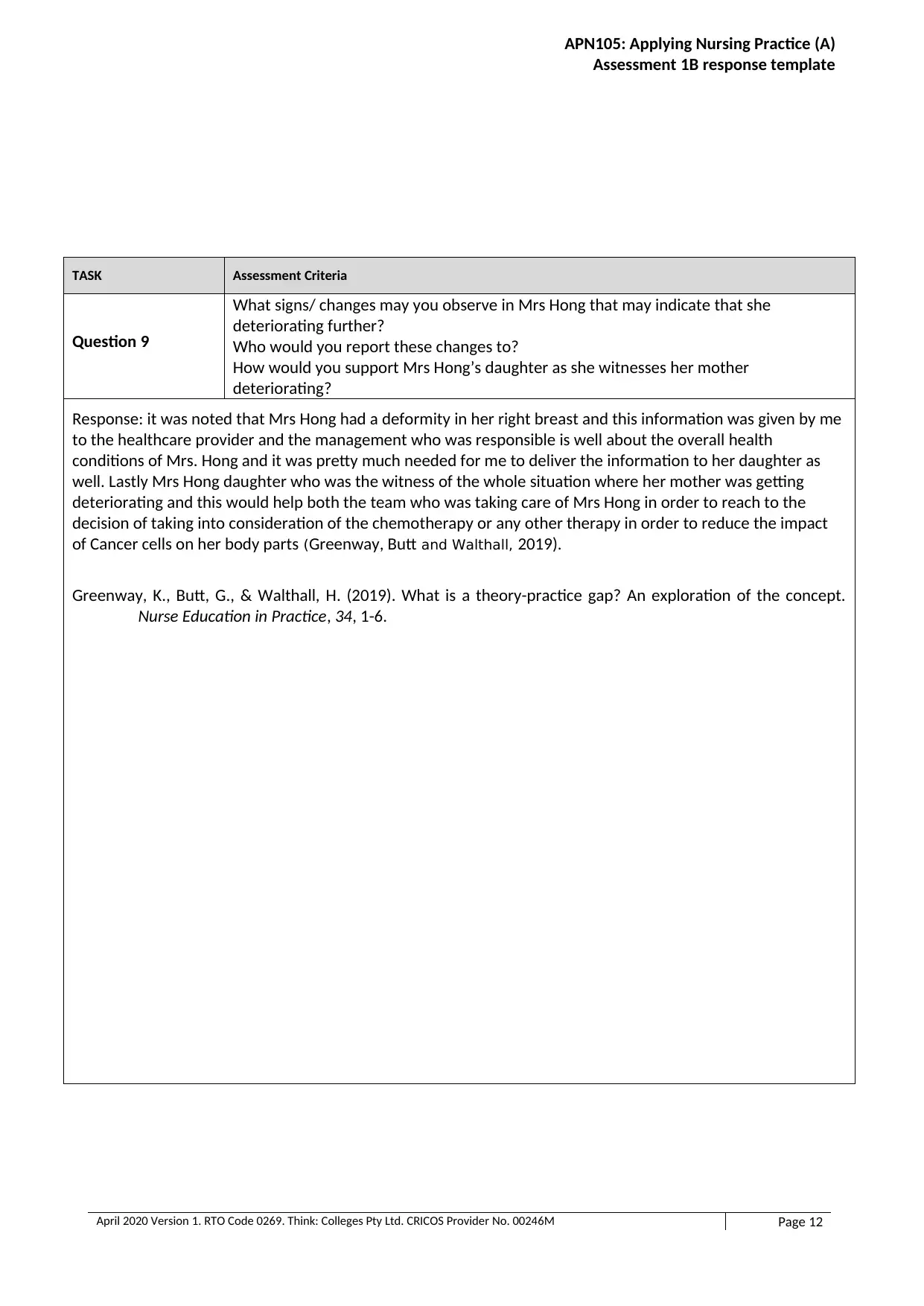
APN105: Applying Nursing Practice (A)
Assessment 1B response template
TASK Assessment Criteria
Question 9
What signs/ changes may you observe in Mrs Hong that may indicate that she
deteriorating further?
Who would you report these changes to?
How would you support Mrs Hong’s daughter as she witnesses her mother
deteriorating?
Response: it was noted that Mrs Hong had a deformity in her right breast and this information was given by me
to the healthcare provider and the management who was responsible is well about the overall health
conditions of Mrs. Hong and it was pretty much needed for me to deliver the information to her daughter as
well. Lastly Mrs Hong daughter who was the witness of the whole situation where her mother was getting
deteriorating and this would help both the team who was taking care of Mrs Hong in order to reach to the
decision of taking into consideration of the chemotherapy or any other therapy in order to reduce the impact
of Cancer cells on her body parts (Greenway, Butt and Walthall, 2019).
Greenway, K., Butt, G., & Walthall, H. (2019). What is a theory-practice gap? An exploration of the concept.
Nurse Education in Practice, 34, 1-6.
April 2020 Version 1. RTO Code 0269. Think: Colleges Pty Ltd. CRICOS Provider No. 00246M Page 12
Assessment 1B response template
TASK Assessment Criteria
Question 9
What signs/ changes may you observe in Mrs Hong that may indicate that she
deteriorating further?
Who would you report these changes to?
How would you support Mrs Hong’s daughter as she witnesses her mother
deteriorating?
Response: it was noted that Mrs Hong had a deformity in her right breast and this information was given by me
to the healthcare provider and the management who was responsible is well about the overall health
conditions of Mrs. Hong and it was pretty much needed for me to deliver the information to her daughter as
well. Lastly Mrs Hong daughter who was the witness of the whole situation where her mother was getting
deteriorating and this would help both the team who was taking care of Mrs Hong in order to reach to the
decision of taking into consideration of the chemotherapy or any other therapy in order to reduce the impact
of Cancer cells on her body parts (Greenway, Butt and Walthall, 2019).
Greenway, K., Butt, G., & Walthall, H. (2019). What is a theory-practice gap? An exploration of the concept.
Nurse Education in Practice, 34, 1-6.
April 2020 Version 1. RTO Code 0269. Think: Colleges Pty Ltd. CRICOS Provider No. 00246M Page 12
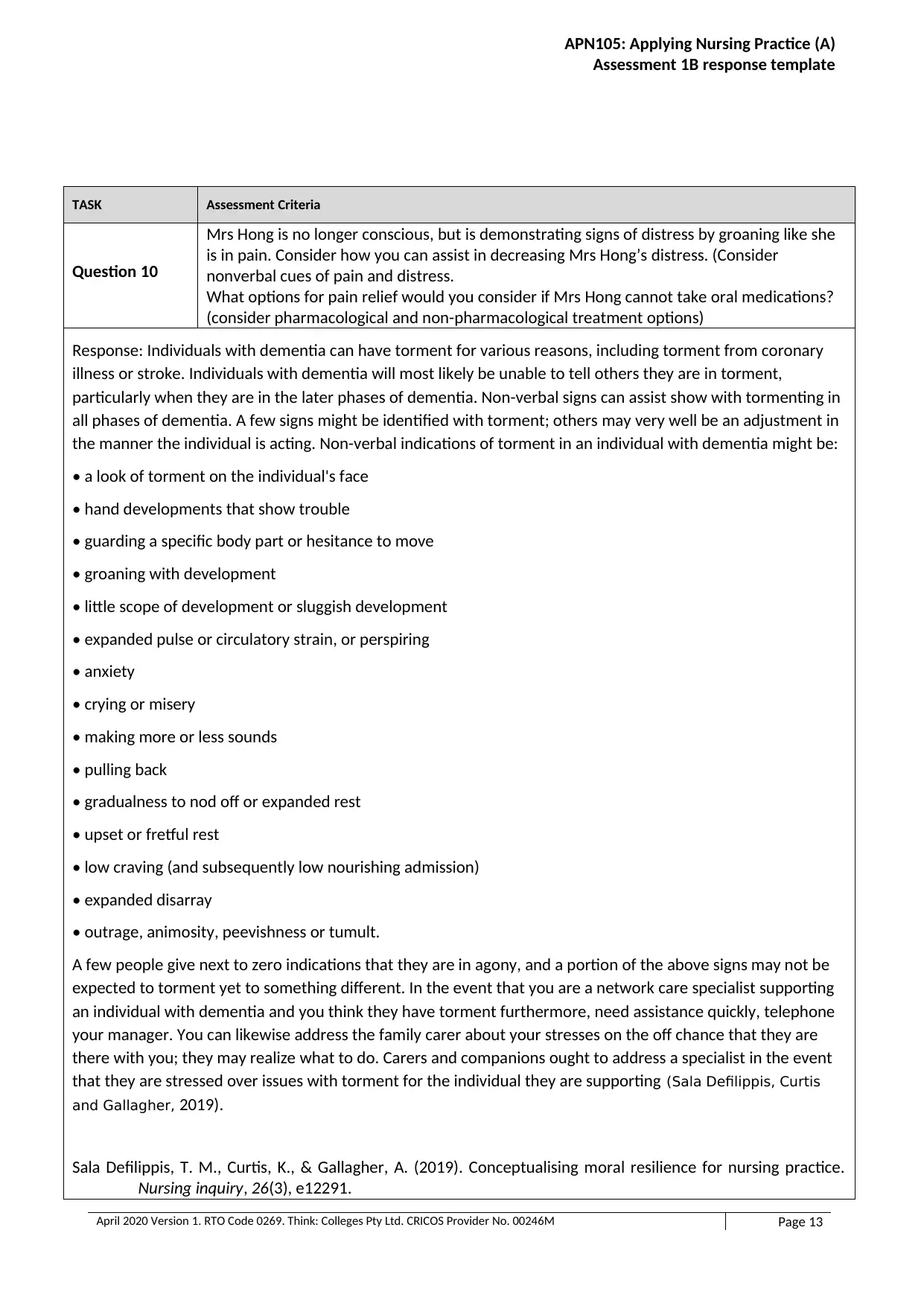
APN105: Applying Nursing Practice (A)
Assessment 1B response template
TASK Assessment Criteria
Question 10
Mrs Hong is no longer conscious, but is demonstrating signs of distress by groaning like she
is in pain. Consider how you can assist in decreasing Mrs Hong’s distress. (Consider
nonverbal cues of pain and distress.
What options for pain relief would you consider if Mrs Hong cannot take oral medications?
(consider pharmacological and non-pharmacological treatment options)
Response: Individuals with dementia can have torment for various reasons, including torment from coronary
illness or stroke. Individuals with dementia will most likely be unable to tell others they are in torment,
particularly when they are in the later phases of dementia. Non-verbal signs can assist show with tormenting in
all phases of dementia. A few signs might be identified with torment; others may very well be an adjustment in
the manner the individual is acting. Non-verbal indications of torment in an individual with dementia might be:
• a look of torment on the individual's face
• hand developments that show trouble
• guarding a specific body part or hesitance to move
• groaning with development
• little scope of development or sluggish development
• expanded pulse or circulatory strain, or perspiring
• anxiety
• crying or misery
• making more or less sounds
• pulling back
• gradualness to nod off or expanded rest
• upset or fretful rest
• low craving (and subsequently low nourishing admission)
• expanded disarray
• outrage, animosity, peevishness or tumult.
A few people give next to zero indications that they are in agony, and a portion of the above signs may not be
expected to torment yet to something different. In the event that you are a network care specialist supporting
an individual with dementia and you think they have torment furthermore, need assistance quickly, telephone
your manager. You can likewise address the family carer about your stresses on the off chance that they are
there with you; they may realize what to do. Carers and companions ought to address a specialist in the event
that they are stressed over issues with torment for the individual they are supporting (Sala Defilippis, Curtis
and Gallagher, 2019).
Sala Defilippis, T. M., Curtis, K., & Gallagher, A. (2019). Conceptualising moral resilience for nursing practice.
Nursing inquiry, 26(3), e12291.
April 2020 Version 1. RTO Code 0269. Think: Colleges Pty Ltd. CRICOS Provider No. 00246M Page 13
Assessment 1B response template
TASK Assessment Criteria
Question 10
Mrs Hong is no longer conscious, but is demonstrating signs of distress by groaning like she
is in pain. Consider how you can assist in decreasing Mrs Hong’s distress. (Consider
nonverbal cues of pain and distress.
What options for pain relief would you consider if Mrs Hong cannot take oral medications?
(consider pharmacological and non-pharmacological treatment options)
Response: Individuals with dementia can have torment for various reasons, including torment from coronary
illness or stroke. Individuals with dementia will most likely be unable to tell others they are in torment,
particularly when they are in the later phases of dementia. Non-verbal signs can assist show with tormenting in
all phases of dementia. A few signs might be identified with torment; others may very well be an adjustment in
the manner the individual is acting. Non-verbal indications of torment in an individual with dementia might be:
• a look of torment on the individual's face
• hand developments that show trouble
• guarding a specific body part or hesitance to move
• groaning with development
• little scope of development or sluggish development
• expanded pulse or circulatory strain, or perspiring
• anxiety
• crying or misery
• making more or less sounds
• pulling back
• gradualness to nod off or expanded rest
• upset or fretful rest
• low craving (and subsequently low nourishing admission)
• expanded disarray
• outrage, animosity, peevishness or tumult.
A few people give next to zero indications that they are in agony, and a portion of the above signs may not be
expected to torment yet to something different. In the event that you are a network care specialist supporting
an individual with dementia and you think they have torment furthermore, need assistance quickly, telephone
your manager. You can likewise address the family carer about your stresses on the off chance that they are
there with you; they may realize what to do. Carers and companions ought to address a specialist in the event
that they are stressed over issues with torment for the individual they are supporting (Sala Defilippis, Curtis
and Gallagher, 2019).
Sala Defilippis, T. M., Curtis, K., & Gallagher, A. (2019). Conceptualising moral resilience for nursing practice.
Nursing inquiry, 26(3), e12291.
April 2020 Version 1. RTO Code 0269. Think: Colleges Pty Ltd. CRICOS Provider No. 00246M Page 13
Paraphrase This Document
Need a fresh take? Get an instant paraphrase of this document with our AI Paraphraser
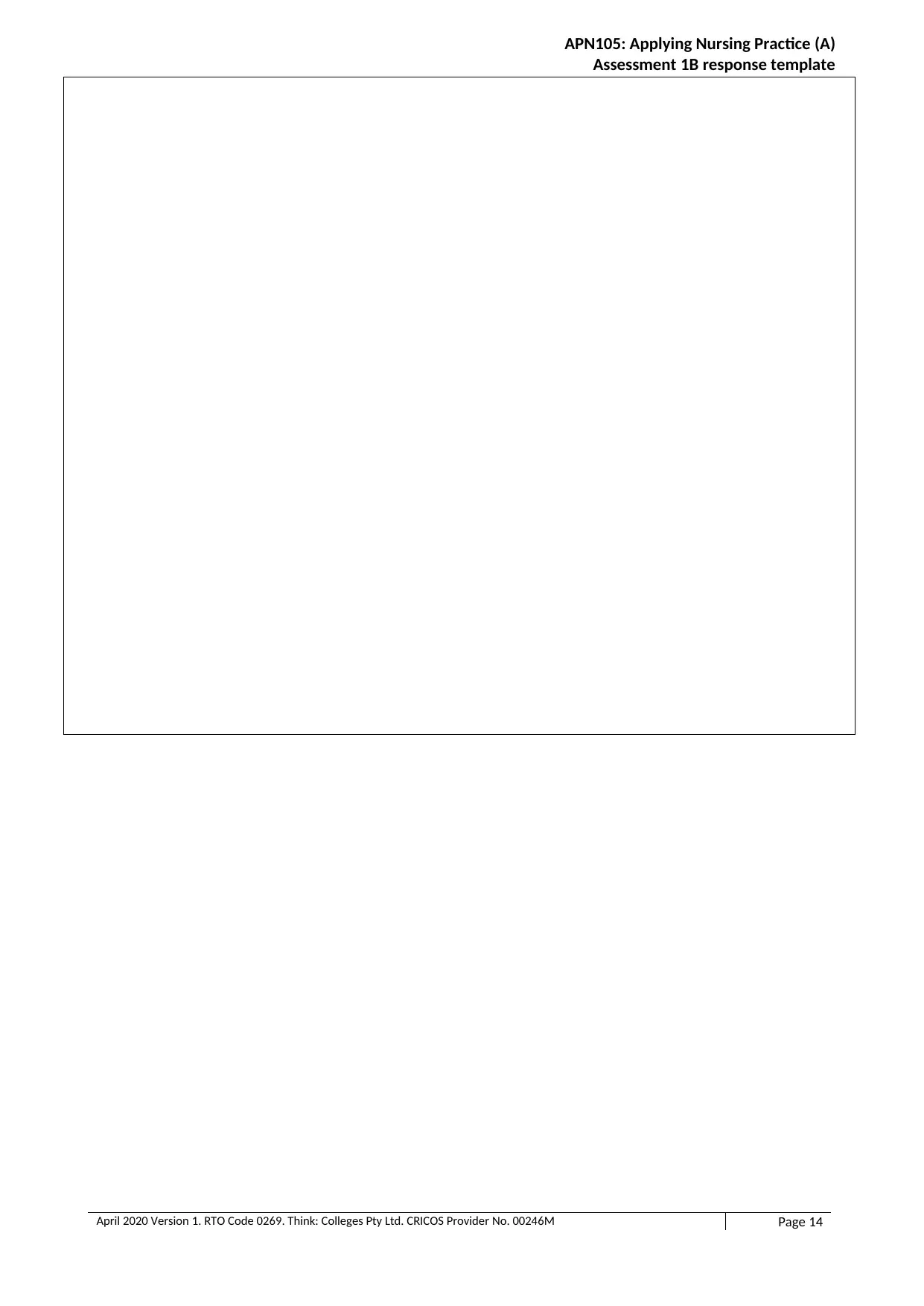
APN105: Applying Nursing Practice (A)
Assessment 1B response template
April 2020 Version 1. RTO Code 0269. Think: Colleges Pty Ltd. CRICOS Provider No. 00246M Page 14
Assessment 1B response template
April 2020 Version 1. RTO Code 0269. Think: Colleges Pty Ltd. CRICOS Provider No. 00246M Page 14
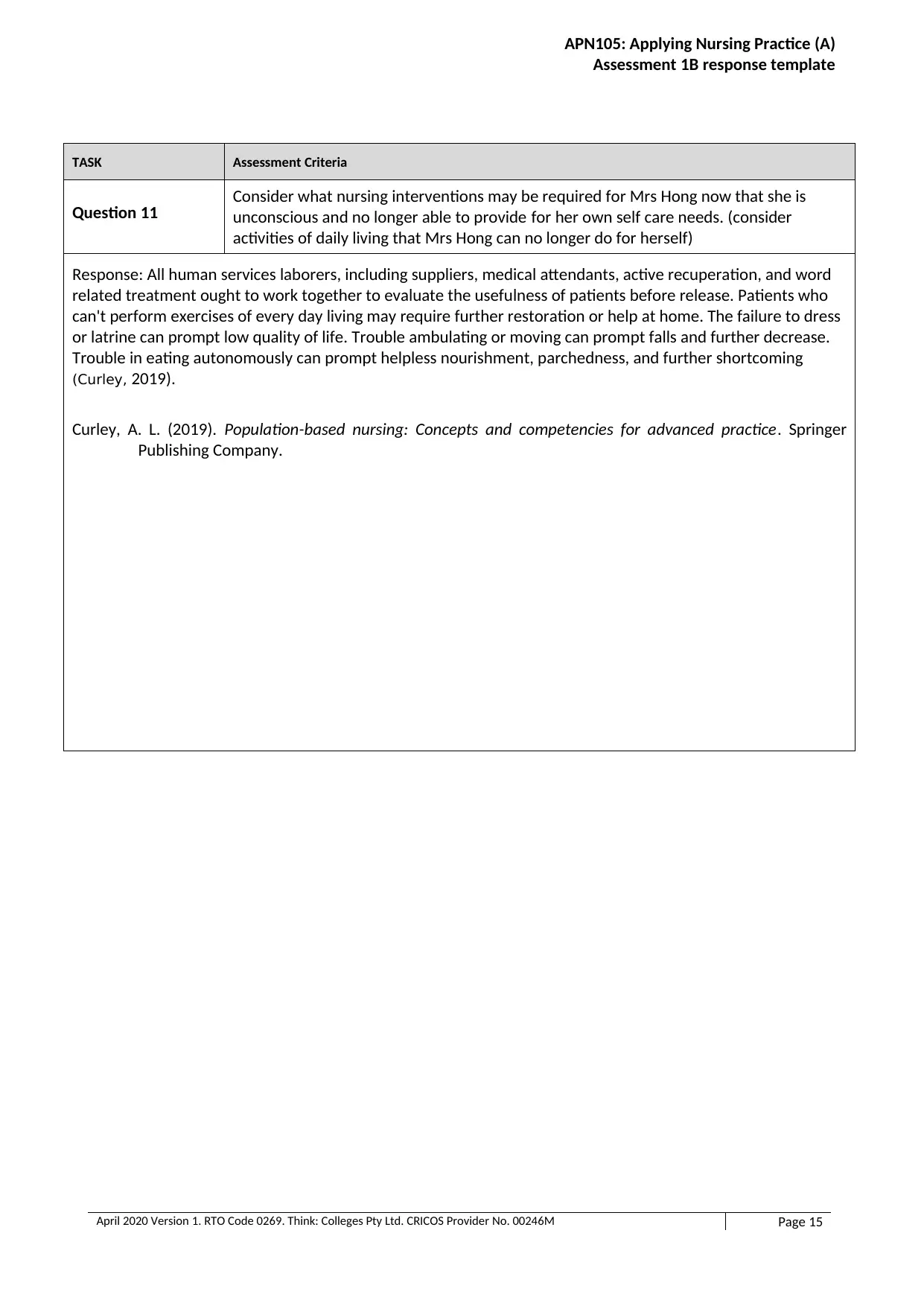
APN105: Applying Nursing Practice (A)
Assessment 1B response template
TASK Assessment Criteria
Question 11 Consider what nursing interventions may be required for Mrs Hong now that she is
unconscious and no longer able to provide for her own self care needs. (consider
activities of daily living that Mrs Hong can no longer do for herself)
Response: All human services laborers, including suppliers, medical attendants, active recuperation, and word
related treatment ought to work together to evaluate the usefulness of patients before release. Patients who
can't perform exercises of every day living may require further restoration or help at home. The failure to dress
or latrine can prompt low quality of life. Trouble ambulating or moving can prompt falls and further decrease.
Trouble in eating autonomously can prompt helpless nourishment, parchedness, and further shortcoming
(Curley, 2019).
Curley, A. L. (2019). Population-based nursing: Concepts and competencies for advanced practice. Springer
Publishing Company.
April 2020 Version 1. RTO Code 0269. Think: Colleges Pty Ltd. CRICOS Provider No. 00246M Page 15
Assessment 1B response template
TASK Assessment Criteria
Question 11 Consider what nursing interventions may be required for Mrs Hong now that she is
unconscious and no longer able to provide for her own self care needs. (consider
activities of daily living that Mrs Hong can no longer do for herself)
Response: All human services laborers, including suppliers, medical attendants, active recuperation, and word
related treatment ought to work together to evaluate the usefulness of patients before release. Patients who
can't perform exercises of every day living may require further restoration or help at home. The failure to dress
or latrine can prompt low quality of life. Trouble ambulating or moving can prompt falls and further decrease.
Trouble in eating autonomously can prompt helpless nourishment, parchedness, and further shortcoming
(Curley, 2019).
Curley, A. L. (2019). Population-based nursing: Concepts and competencies for advanced practice. Springer
Publishing Company.
April 2020 Version 1. RTO Code 0269. Think: Colleges Pty Ltd. CRICOS Provider No. 00246M Page 15
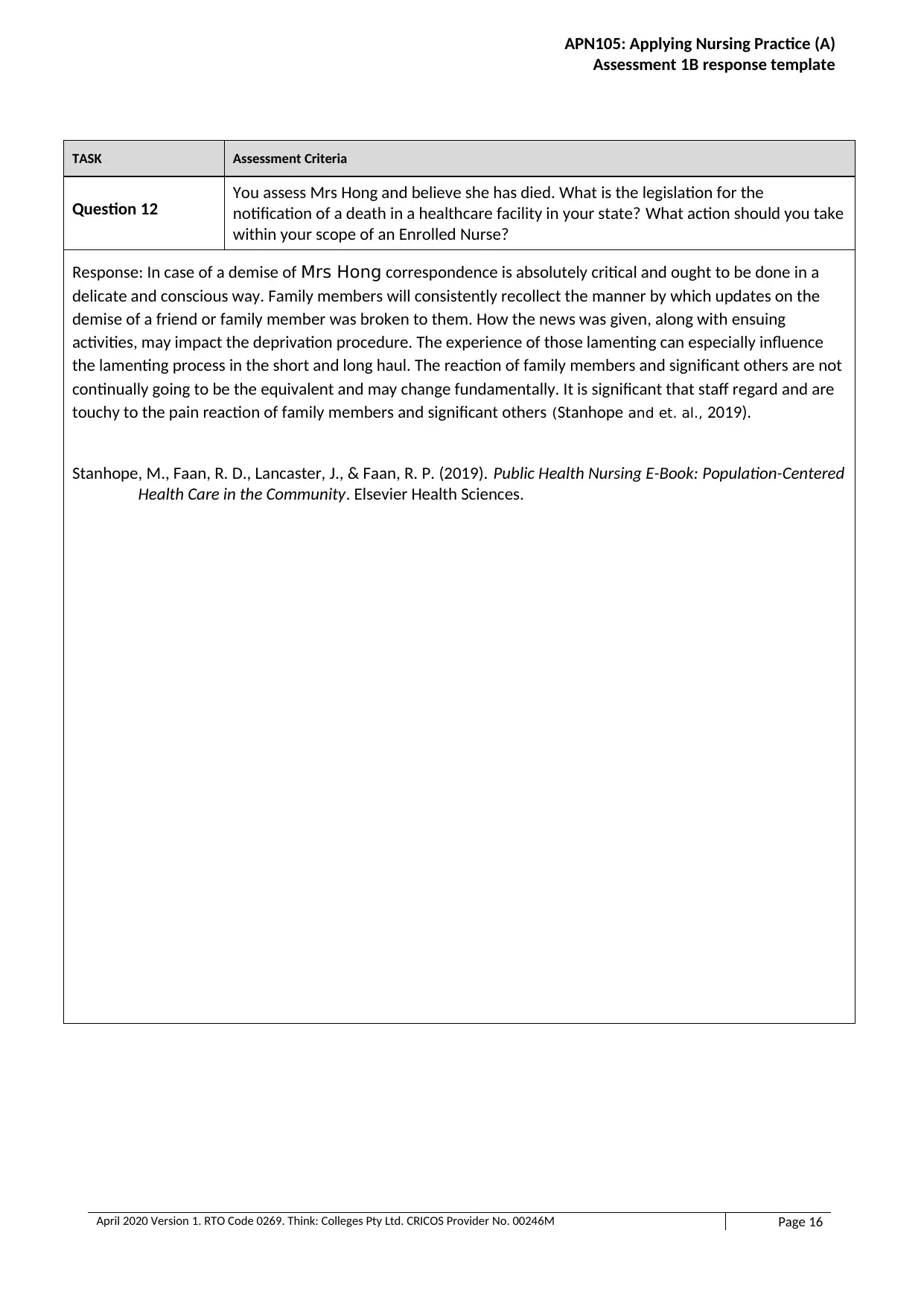
APN105: Applying Nursing Practice (A)
Assessment 1B response template
TASK Assessment Criteria
Question 12 You assess Mrs Hong and believe she has died. What is the legislation for the
notification of a death in a healthcare facility in your state? What action should you take
within your scope of an Enrolled Nurse?
Response: In case of a demise of Mrs Hong correspondence is absolutely critical and ought to be done in a
delicate and conscious way. Family members will consistently recollect the manner by which updates on the
demise of a friend or family member was broken to them. How the news was given, along with ensuing
activities, may impact the deprivation procedure. The experience of those lamenting can especially influence
the lamenting process in the short and long haul. The reaction of family members and significant others are not
continually going to be the equivalent and may change fundamentally. It is significant that staff regard and are
touchy to the pain reaction of family members and significant others (Stanhope and et. al., 2019).
Stanhope, M., Faan, R. D., Lancaster, J., & Faan, R. P. (2019). Public Health Nursing E-Book: Population-Centered
Health Care in the Community. Elsevier Health Sciences.
April 2020 Version 1. RTO Code 0269. Think: Colleges Pty Ltd. CRICOS Provider No. 00246M Page 16
Assessment 1B response template
TASK Assessment Criteria
Question 12 You assess Mrs Hong and believe she has died. What is the legislation for the
notification of a death in a healthcare facility in your state? What action should you take
within your scope of an Enrolled Nurse?
Response: In case of a demise of Mrs Hong correspondence is absolutely critical and ought to be done in a
delicate and conscious way. Family members will consistently recollect the manner by which updates on the
demise of a friend or family member was broken to them. How the news was given, along with ensuing
activities, may impact the deprivation procedure. The experience of those lamenting can especially influence
the lamenting process in the short and long haul. The reaction of family members and significant others are not
continually going to be the equivalent and may change fundamentally. It is significant that staff regard and are
touchy to the pain reaction of family members and significant others (Stanhope and et. al., 2019).
Stanhope, M., Faan, R. D., Lancaster, J., & Faan, R. P. (2019). Public Health Nursing E-Book: Population-Centered
Health Care in the Community. Elsevier Health Sciences.
April 2020 Version 1. RTO Code 0269. Think: Colleges Pty Ltd. CRICOS Provider No. 00246M Page 16
Secure Best Marks with AI Grader
Need help grading? Try our AI Grader for instant feedback on your assignments.
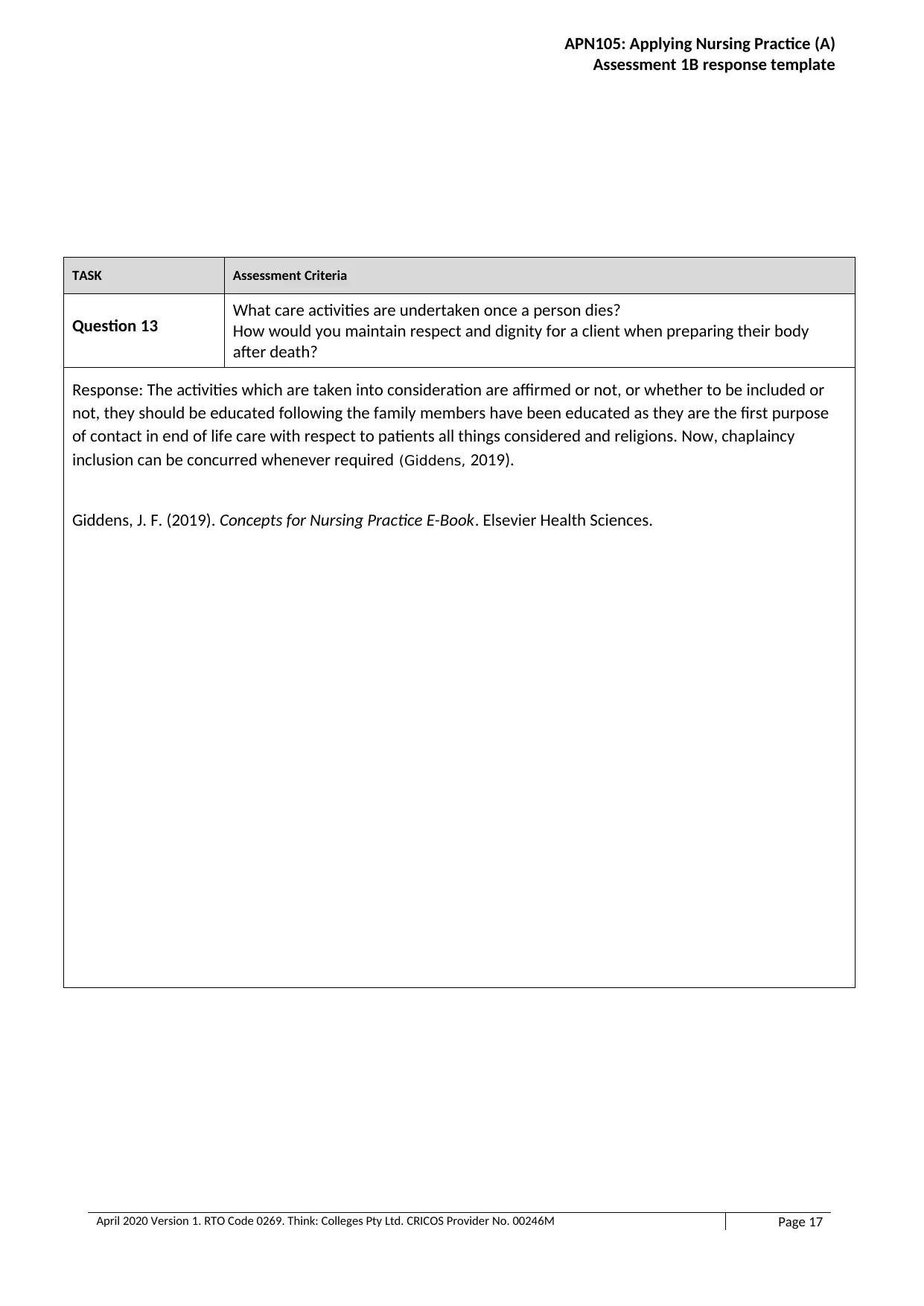
APN105: Applying Nursing Practice (A)
Assessment 1B response template
TASK Assessment Criteria
Question 13 What care activities are undertaken once a person dies?
How would you maintain respect and dignity for a client when preparing their body
after death?
Response: The activities which are taken into consideration are affirmed or not, or whether to be included or
not, they should be educated following the family members have been educated as they are the first purpose
of contact in end of life care with respect to patients all things considered and religions. Now, chaplaincy
inclusion can be concurred whenever required (Giddens, 2019).
Giddens, J. F. (2019). Concepts for Nursing Practice E-Book. Elsevier Health Sciences.
April 2020 Version 1. RTO Code 0269. Think: Colleges Pty Ltd. CRICOS Provider No. 00246M Page 17
Assessment 1B response template
TASK Assessment Criteria
Question 13 What care activities are undertaken once a person dies?
How would you maintain respect and dignity for a client when preparing their body
after death?
Response: The activities which are taken into consideration are affirmed or not, or whether to be included or
not, they should be educated following the family members have been educated as they are the first purpose
of contact in end of life care with respect to patients all things considered and religions. Now, chaplaincy
inclusion can be concurred whenever required (Giddens, 2019).
Giddens, J. F. (2019). Concepts for Nursing Practice E-Book. Elsevier Health Sciences.
April 2020 Version 1. RTO Code 0269. Think: Colleges Pty Ltd. CRICOS Provider No. 00246M Page 17
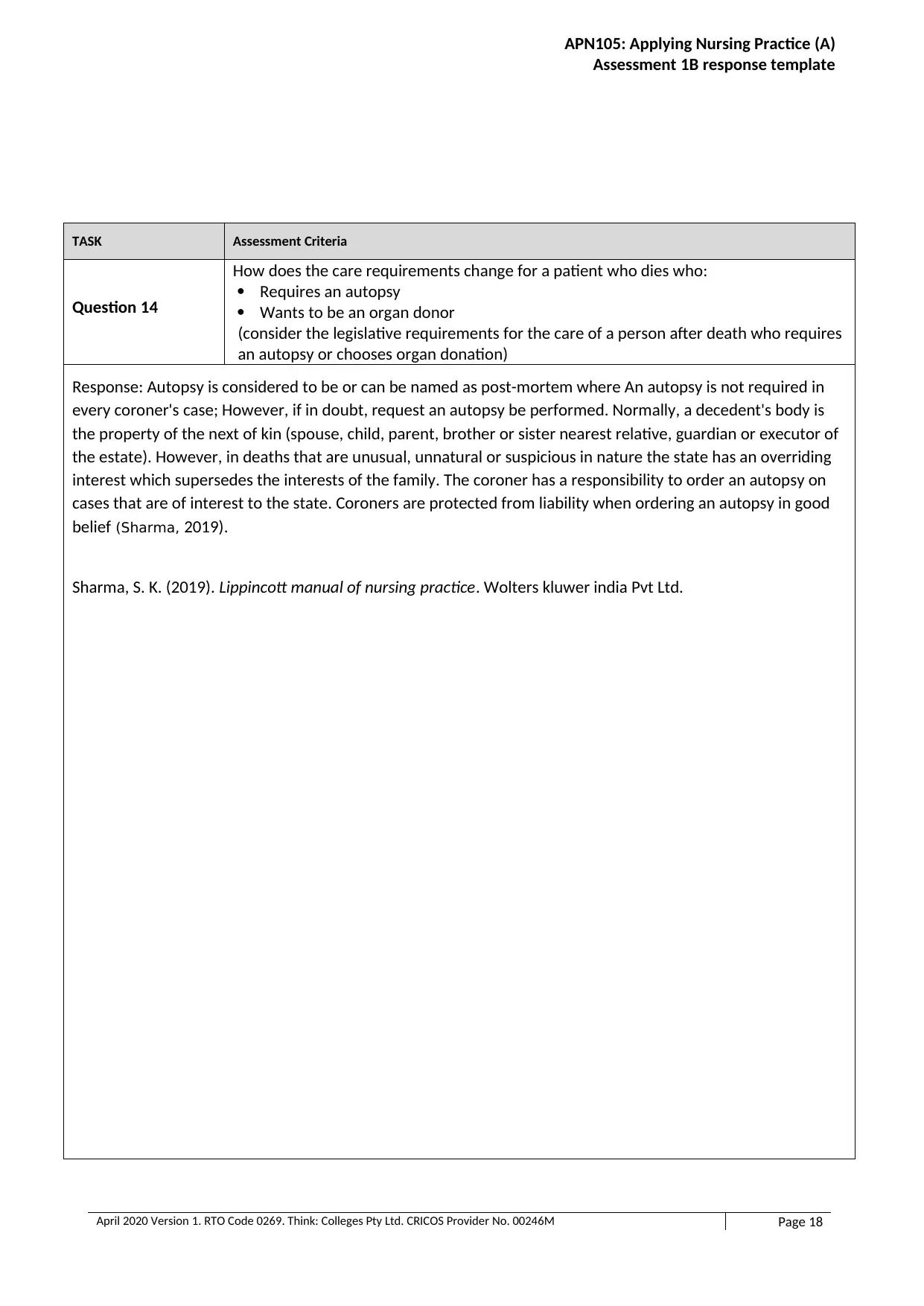
APN105: Applying Nursing Practice (A)
Assessment 1B response template
TASK Assessment Criteria
Question 14
How does the care requirements change for a patient who dies who:
Requires an autopsy
Wants to be an organ donor
(consider the legislative requirements for the care of a person after death who requires
an autopsy or chooses organ donation)
Response: Autopsy is considered to be or can be named as post-mortem where An autopsy is not required in
every coroner's case; However, if in doubt, request an autopsy be performed. Normally, a decedent's body is
the property of the next of kin (spouse, child, parent, brother or sister nearest relative, guardian or executor of
the estate). However, in deaths that are unusual, unnatural or suspicious in nature the state has an overriding
interest which supersedes the interests of the family. The coroner has a responsibility to order an autopsy on
cases that are of interest to the state. Coroners are protected from liability when ordering an autopsy in good
belief (Sharma, 2019).
Sharma, S. K. (2019). Lippincott manual of nursing practice. Wolters kluwer india Pvt Ltd.
April 2020 Version 1. RTO Code 0269. Think: Colleges Pty Ltd. CRICOS Provider No. 00246M Page 18
Assessment 1B response template
TASK Assessment Criteria
Question 14
How does the care requirements change for a patient who dies who:
Requires an autopsy
Wants to be an organ donor
(consider the legislative requirements for the care of a person after death who requires
an autopsy or chooses organ donation)
Response: Autopsy is considered to be or can be named as post-mortem where An autopsy is not required in
every coroner's case; However, if in doubt, request an autopsy be performed. Normally, a decedent's body is
the property of the next of kin (spouse, child, parent, brother or sister nearest relative, guardian or executor of
the estate). However, in deaths that are unusual, unnatural or suspicious in nature the state has an overriding
interest which supersedes the interests of the family. The coroner has a responsibility to order an autopsy on
cases that are of interest to the state. Coroners are protected from liability when ordering an autopsy in good
belief (Sharma, 2019).
Sharma, S. K. (2019). Lippincott manual of nursing practice. Wolters kluwer india Pvt Ltd.
April 2020 Version 1. RTO Code 0269. Think: Colleges Pty Ltd. CRICOS Provider No. 00246M Page 18
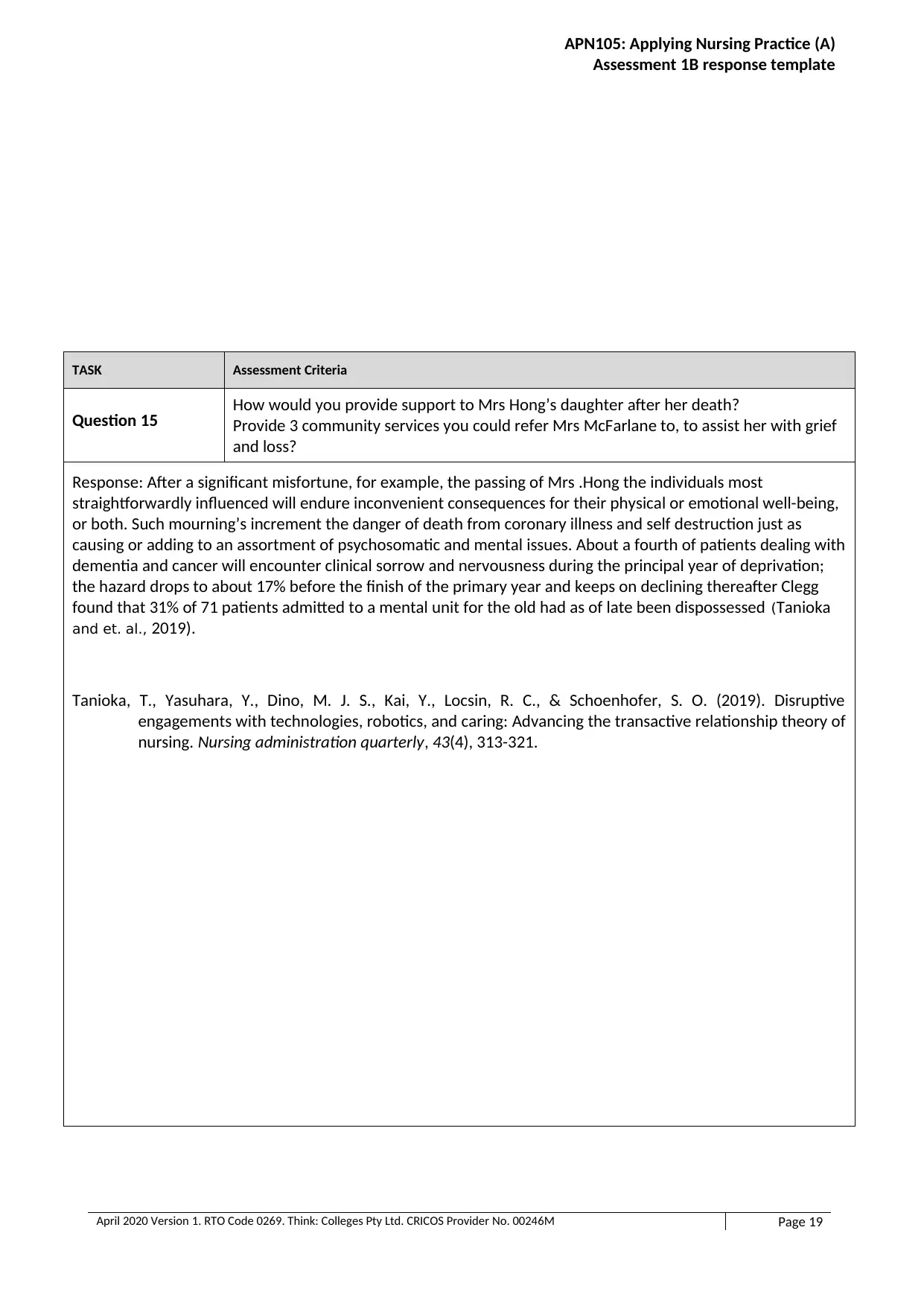
APN105: Applying Nursing Practice (A)
Assessment 1B response template
TASK Assessment Criteria
Question 15 How would you provide support to Mrs Hong’s daughter after her death?
Provide 3 community services you could refer Mrs McFarlane to, to assist her with grief
and loss?
Response: After a significant misfortune, for example, the passing of Mrs .Hong the individuals most
straightforwardly influenced will endure inconvenient consequences for their physical or emotional well-being,
or both. Such mourning’s increment the danger of death from coronary illness and self destruction just as
causing or adding to an assortment of psychosomatic and mental issues. About a fourth of patients dealing with
dementia and cancer will encounter clinical sorrow and nervousness during the principal year of deprivation;
the hazard drops to about 17% before the finish of the primary year and keeps on declining thereafter Clegg
found that 31% of 71 patients admitted to a mental unit for the old had as of late been dispossessed (Tanioka
and et. al., 2019).
Tanioka, T., Yasuhara, Y., Dino, M. J. S., Kai, Y., Locsin, R. C., & Schoenhofer, S. O. (2019). Disruptive
engagements with technologies, robotics, and caring: Advancing the transactive relationship theory of
nursing. Nursing administration quarterly, 43(4), 313-321.
April 2020 Version 1. RTO Code 0269. Think: Colleges Pty Ltd. CRICOS Provider No. 00246M Page 19
Assessment 1B response template
TASK Assessment Criteria
Question 15 How would you provide support to Mrs Hong’s daughter after her death?
Provide 3 community services you could refer Mrs McFarlane to, to assist her with grief
and loss?
Response: After a significant misfortune, for example, the passing of Mrs .Hong the individuals most
straightforwardly influenced will endure inconvenient consequences for their physical or emotional well-being,
or both. Such mourning’s increment the danger of death from coronary illness and self destruction just as
causing or adding to an assortment of psychosomatic and mental issues. About a fourth of patients dealing with
dementia and cancer will encounter clinical sorrow and nervousness during the principal year of deprivation;
the hazard drops to about 17% before the finish of the primary year and keeps on declining thereafter Clegg
found that 31% of 71 patients admitted to a mental unit for the old had as of late been dispossessed (Tanioka
and et. al., 2019).
Tanioka, T., Yasuhara, Y., Dino, M. J. S., Kai, Y., Locsin, R. C., & Schoenhofer, S. O. (2019). Disruptive
engagements with technologies, robotics, and caring: Advancing the transactive relationship theory of
nursing. Nursing administration quarterly, 43(4), 313-321.
April 2020 Version 1. RTO Code 0269. Think: Colleges Pty Ltd. CRICOS Provider No. 00246M Page 19
Paraphrase This Document
Need a fresh take? Get an instant paraphrase of this document with our AI Paraphraser
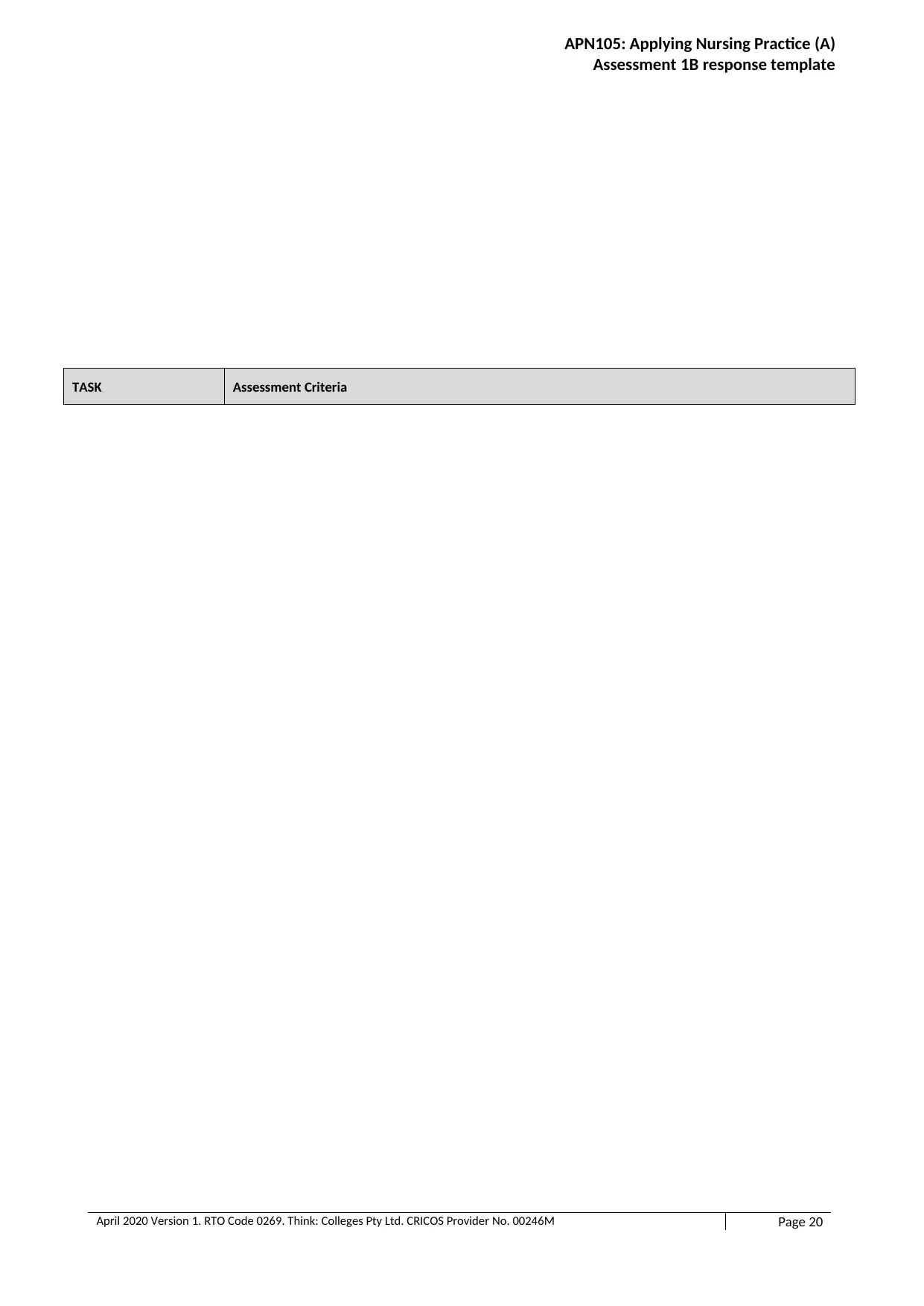
APN105: Applying Nursing Practice (A)
Assessment 1B response template
TASK Assessment Criteria
April 2020 Version 1. RTO Code 0269. Think: Colleges Pty Ltd. CRICOS Provider No. 00246M Page 20
Assessment 1B response template
TASK Assessment Criteria
April 2020 Version 1. RTO Code 0269. Think: Colleges Pty Ltd. CRICOS Provider No. 00246M Page 20
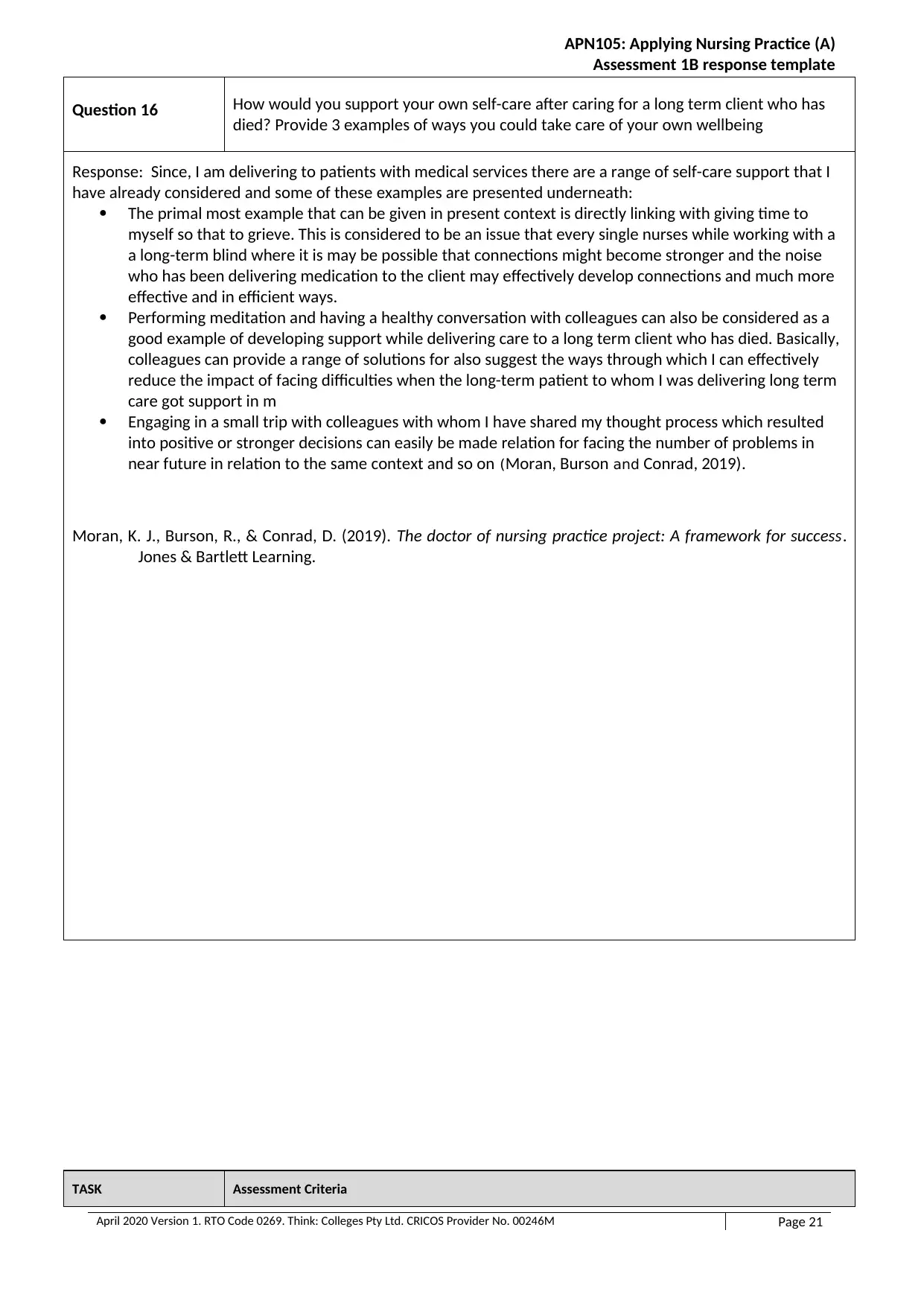
APN105: Applying Nursing Practice (A)
Assessment 1B response template
Question 16 How would you support your own self-care after caring for a long term client who has
died? Provide 3 examples of ways you could take care of your own wellbeing
Response: Since, I am delivering to patients with medical services there are a range of self-care support that I
have already considered and some of these examples are presented underneath:
The primal most example that can be given in present context is directly linking with giving time to
myself so that to grieve. This is considered to be an issue that every single nurses while working with a
a long-term blind where it is may be possible that connections might become stronger and the noise
who has been delivering medication to the client may effectively develop connections and much more
effective and in efficient ways.
Performing meditation and having a healthy conversation with colleagues can also be considered as a
good example of developing support while delivering care to a long term client who has died. Basically,
colleagues can provide a range of solutions for also suggest the ways through which I can effectively
reduce the impact of facing difficulties when the long-term patient to whom I was delivering long term
care got support in m
Engaging in a small trip with colleagues with whom I have shared my thought process which resulted
into positive or stronger decisions can easily be made relation for facing the number of problems in
near future in relation to the same context and so on (Moran, Burson and Conrad, 2019).
Moran, K. J., Burson, R., & Conrad, D. (2019). The doctor of nursing practice project: A framework for success.
Jones & Bartlett Learning.
TASK Assessment Criteria
April 2020 Version 1. RTO Code 0269. Think: Colleges Pty Ltd. CRICOS Provider No. 00246M Page 21
Assessment 1B response template
Question 16 How would you support your own self-care after caring for a long term client who has
died? Provide 3 examples of ways you could take care of your own wellbeing
Response: Since, I am delivering to patients with medical services there are a range of self-care support that I
have already considered and some of these examples are presented underneath:
The primal most example that can be given in present context is directly linking with giving time to
myself so that to grieve. This is considered to be an issue that every single nurses while working with a
a long-term blind where it is may be possible that connections might become stronger and the noise
who has been delivering medication to the client may effectively develop connections and much more
effective and in efficient ways.
Performing meditation and having a healthy conversation with colleagues can also be considered as a
good example of developing support while delivering care to a long term client who has died. Basically,
colleagues can provide a range of solutions for also suggest the ways through which I can effectively
reduce the impact of facing difficulties when the long-term patient to whom I was delivering long term
care got support in m
Engaging in a small trip with colleagues with whom I have shared my thought process which resulted
into positive or stronger decisions can easily be made relation for facing the number of problems in
near future in relation to the same context and so on (Moran, Burson and Conrad, 2019).
Moran, K. J., Burson, R., & Conrad, D. (2019). The doctor of nursing practice project: A framework for success.
Jones & Bartlett Learning.
TASK Assessment Criteria
April 2020 Version 1. RTO Code 0269. Think: Colleges Pty Ltd. CRICOS Provider No. 00246M Page 21
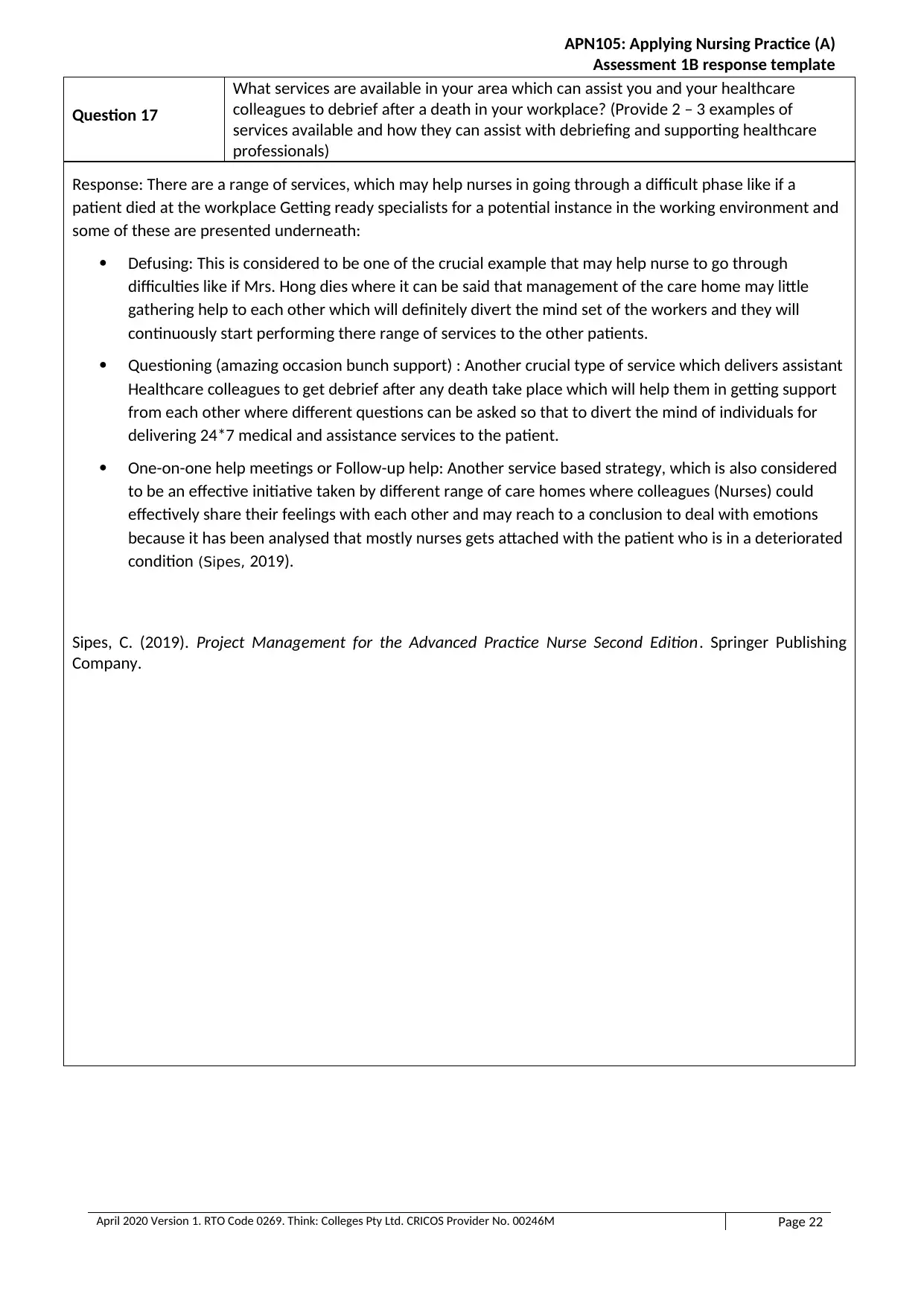
APN105: Applying Nursing Practice (A)
Assessment 1B response template
Question 17
What services are available in your area which can assist you and your healthcare
colleagues to debrief after a death in your workplace? (Provide 2 – 3 examples of
services available and how they can assist with debriefing and supporting healthcare
professionals)
Response: There are a range of services, which may help nurses in going through a difficult phase like if a
patient died at the workplace Getting ready specialists for a potential instance in the working environment and
some of these are presented underneath:
Defusing: This is considered to be one of the crucial example that may help nurse to go through
difficulties like if Mrs. Hong dies where it can be said that management of the care home may little
gathering help to each other which will definitely divert the mind set of the workers and they will
continuously start performing there range of services to the other patients.
Questioning (amazing occasion bunch support) : Another crucial type of service which delivers assistant
Healthcare colleagues to get debrief after any death take place which will help them in getting support
from each other where different questions can be asked so that to divert the mind of individuals for
delivering 24*7 medical and assistance services to the patient.
One-on-one help meetings or Follow-up help: Another service based strategy, which is also considered
to be an effective initiative taken by different range of care homes where colleagues (Nurses) could
effectively share their feelings with each other and may reach to a conclusion to deal with emotions
because it has been analysed that mostly nurses gets attached with the patient who is in a deteriorated
condition (Sipes, 2019).
Sipes, C. (2019). Project Management for the Advanced Practice Nurse Second Edition. Springer Publishing
Company.
April 2020 Version 1. RTO Code 0269. Think: Colleges Pty Ltd. CRICOS Provider No. 00246M Page 22
Assessment 1B response template
Question 17
What services are available in your area which can assist you and your healthcare
colleagues to debrief after a death in your workplace? (Provide 2 – 3 examples of
services available and how they can assist with debriefing and supporting healthcare
professionals)
Response: There are a range of services, which may help nurses in going through a difficult phase like if a
patient died at the workplace Getting ready specialists for a potential instance in the working environment and
some of these are presented underneath:
Defusing: This is considered to be one of the crucial example that may help nurse to go through
difficulties like if Mrs. Hong dies where it can be said that management of the care home may little
gathering help to each other which will definitely divert the mind set of the workers and they will
continuously start performing there range of services to the other patients.
Questioning (amazing occasion bunch support) : Another crucial type of service which delivers assistant
Healthcare colleagues to get debrief after any death take place which will help them in getting support
from each other where different questions can be asked so that to divert the mind of individuals for
delivering 24*7 medical and assistance services to the patient.
One-on-one help meetings or Follow-up help: Another service based strategy, which is also considered
to be an effective initiative taken by different range of care homes where colleagues (Nurses) could
effectively share their feelings with each other and may reach to a conclusion to deal with emotions
because it has been analysed that mostly nurses gets attached with the patient who is in a deteriorated
condition (Sipes, 2019).
Sipes, C. (2019). Project Management for the Advanced Practice Nurse Second Edition. Springer Publishing
Company.
April 2020 Version 1. RTO Code 0269. Think: Colleges Pty Ltd. CRICOS Provider No. 00246M Page 22
1 out of 22
Related Documents
Your All-in-One AI-Powered Toolkit for Academic Success.
+13062052269
info@desklib.com
Available 24*7 on WhatsApp / Email
![[object Object]](/_next/static/media/star-bottom.7253800d.svg)
Unlock your academic potential
© 2024 | Zucol Services PVT LTD | All rights reserved.





